Developing an agent for SCML2024 (OneShot)
In 2021, we introduced a new track called SCML-OneShot which implements a simplified problem in which the agent can focus on the many to many concurrent negotiation problem without needing to worry about long term planning or production planning as is the case with the standard and collusion tracks.
SCML-OneShot brief introduction Please refer to the first tutorial for a brief introduction about the world simulated in this game as well as pointers to more information. We will assume knowledge of at least this brief introduction in the remainder of this tutorial.
First things first, let’s create some helper functions that will allow us to evaluate different agents we develop in this tutorial:
from negmas import SAOResponse, ResponseType, Outcome, SAOState
from scml.oneshot.world import SCML2024OneShotWorld as W
from scml.oneshot import *
from scml.runner import WorldRunner
import pandas as pd
from rich.jupyter import print
# create a runner that encapsulates a number of configs to evaluate agents
# in the same conditions every time
CONFIGS, REPS, STEPS = 10, 3, 50
context = ANACOneShotContext(n_steps=STEPS, world_params=dict(construct_graphs=True))
single_agent_runner = WorldRunner(
context, n_configs=CONFIGS, n_repetitions=REPS, save_worlds=True
)
full_market_runner = WorldRunner.from_runner(
single_agent_runner, control_all_agents=True
)
Here we use the WorldRunner class which is designed to allow us to
compare multiple agents in exactly the same conditions. To create a
WorldRunner, you need to pass a context which is used for generating
the worlds in which the agents are evaluated. the SCML package defines
several contexts that allow us to control these worlds. For example the
StrongSupplierContext will always create worlds in which the agent
being evaluated is in the first production level \(L_0\) with more
agents on this level than on the next level. You cand define your own
contexts for experimenting with specific conditions (e.g. specific
exogenous contract distribution, market structure, etc). The most
general context which will produce any world that your agent may
encounter in the ANAC comptition is the
ANACOneShotContext for one-shot worlds and ANACStdContext for
standard worlds.
We create two runners:
single_agent_runner in which a single agent is being evaluated while the rest of the agents are sampled randomly from a subset of SCML built-in agents.
full_market_runner in which all agents in the market are controlled by the agent type being evaluated. This may be helpful in understanding how your agent behaves in this extreme condition but can be misleading as an estimate of the agent’s performance in the official ANAC competition.
This is time to describe some of the tools that the WorldRunner
gives you to evaluate the agent. The WorldRunner is a Callable. You
just call it with the class (agent type) you want to evaluate. You can
optionally pass parameters if you would like to compared different
parameters for example. Remember in this case to also pass a name to
differentiate between different parameter choices.
We are using a relatively large nubmer of configurations, repetitions per configuration and steps (days) per repetition. If you are running this notebook for the first time, consider reducing CONFIGS, REPS, STEPS above to make it run faster.
Testing a completely random agent
Let’s try an agent that behaves randomly:
full_market_runner(RandomOneShotAgent);
We can use the runner now to display the worlds for a given type that we evaluated:
full_market_runner.draw_worlds_of(RandomOneShotAgent);
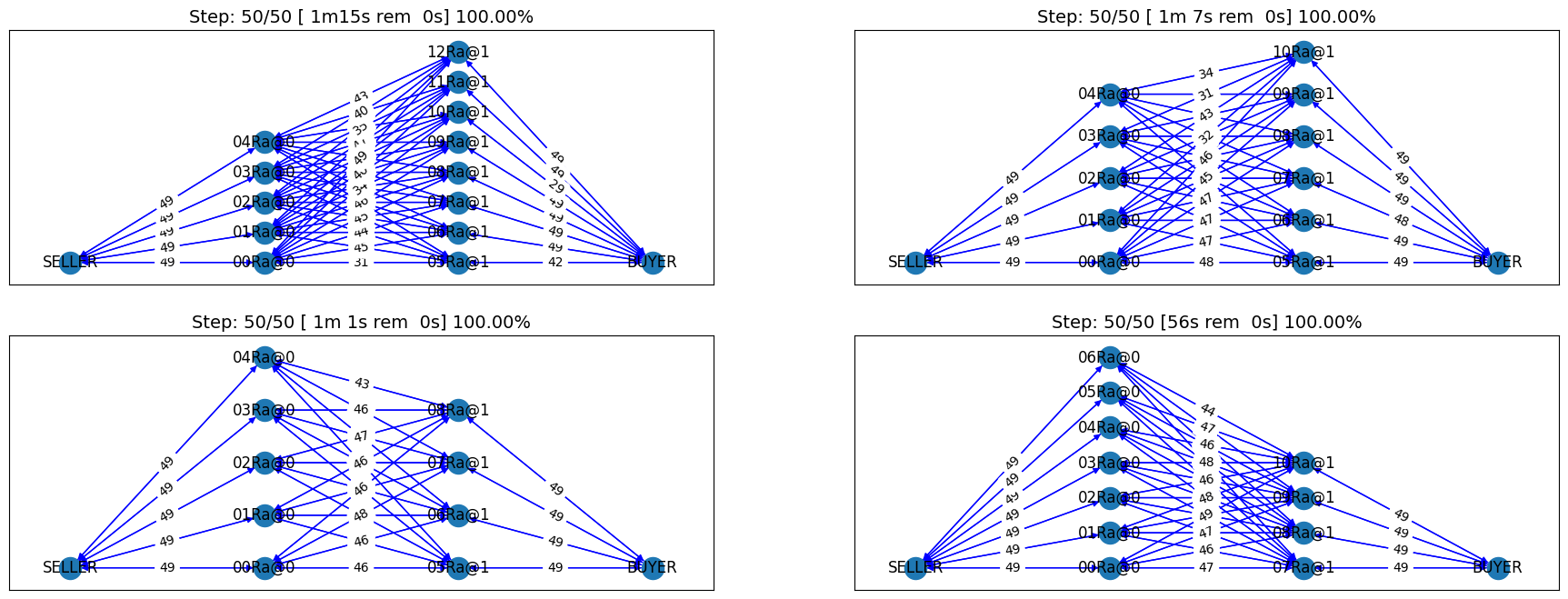
Lots of contracts have been reached, but were they good contracts? We can use the runner now to plot several statistics (e.g. shortfall-penalty, disposal-cost, productivity, and score in this example). There are more than 42 such statistics that you can display.
full_market_runner.plot_stats(agg=False);
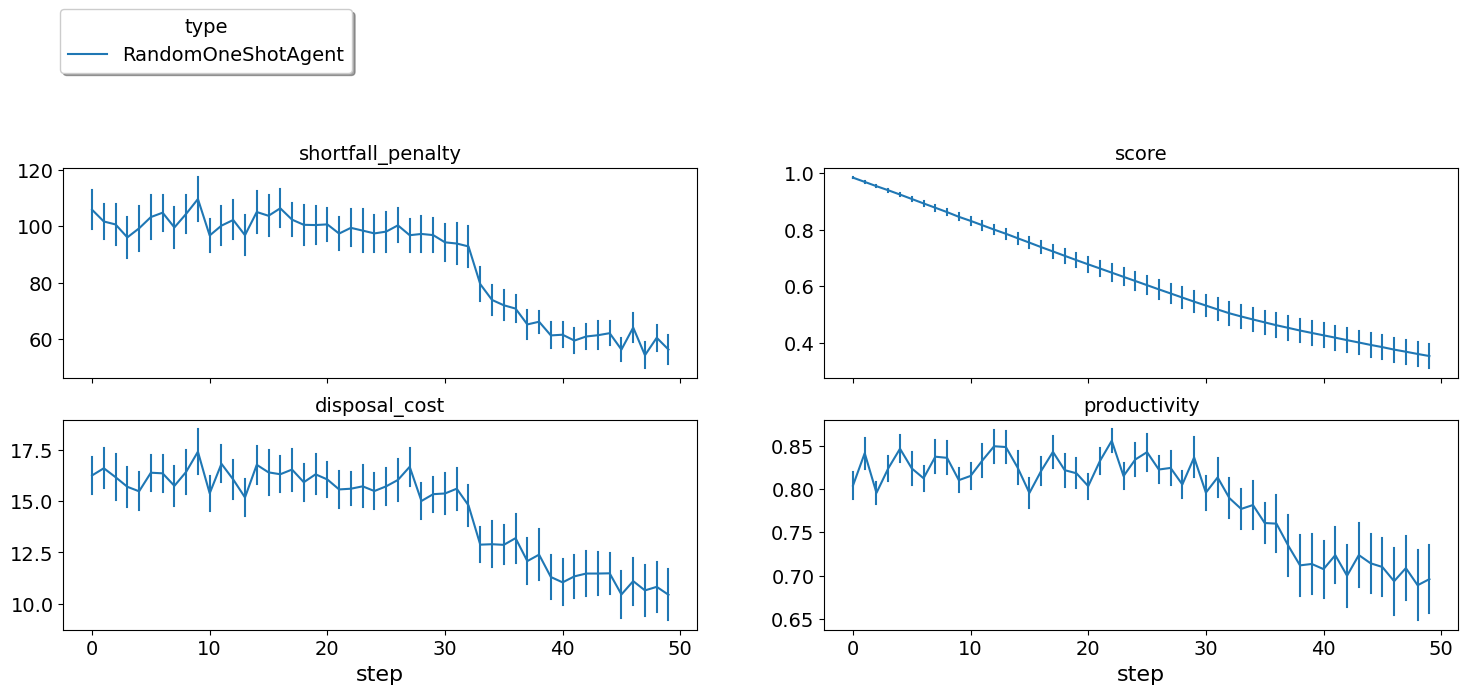
The score is going down monotonically showing that this random agent
is losing money every step. Note that this test was when the agent
controller every factory in the market. This is very different than
the ANAC competition in whic the agent controls a single agent. Luckily,
we already have a runner that tests exactly this case. Let’s see how
does RandomOneShotAgent behave in such cases:
single_agent_runner(RandomOneShotAgent)
single_agent_runner.draw_worlds_of(RandomOneShotAgent);
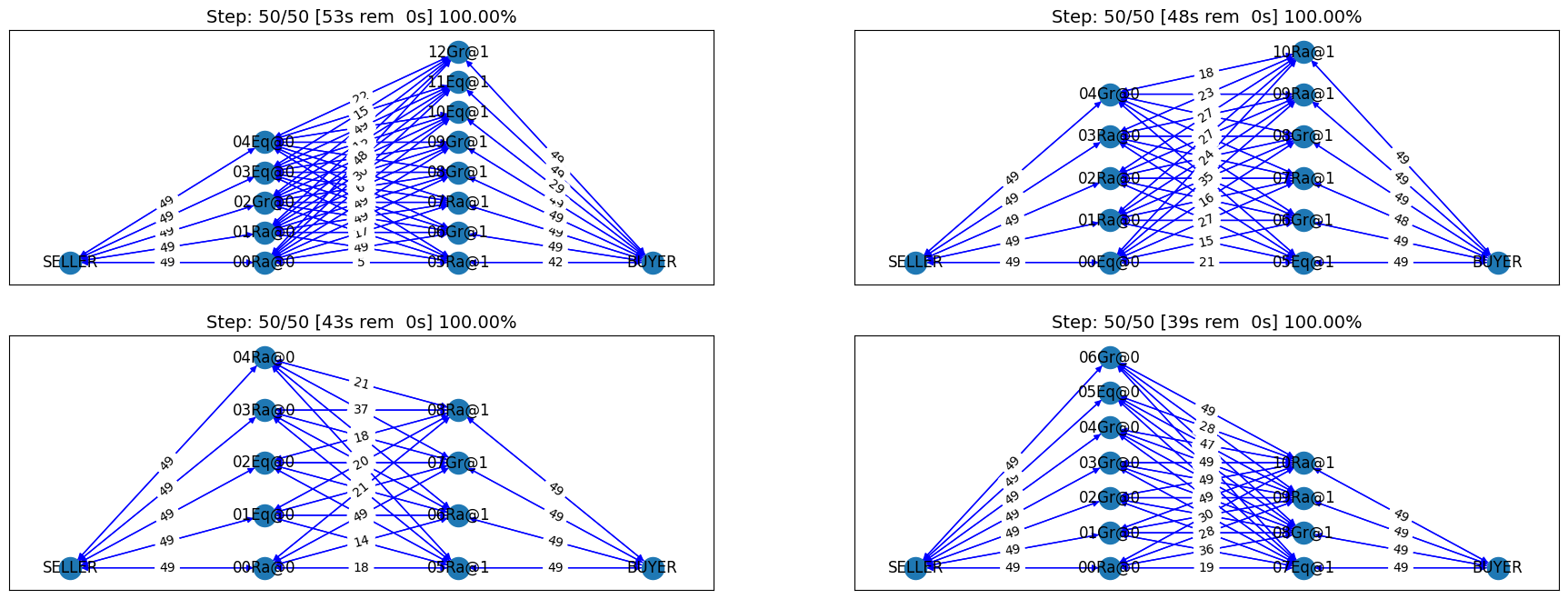
single_agent_runner.plot_stats(agg=False);
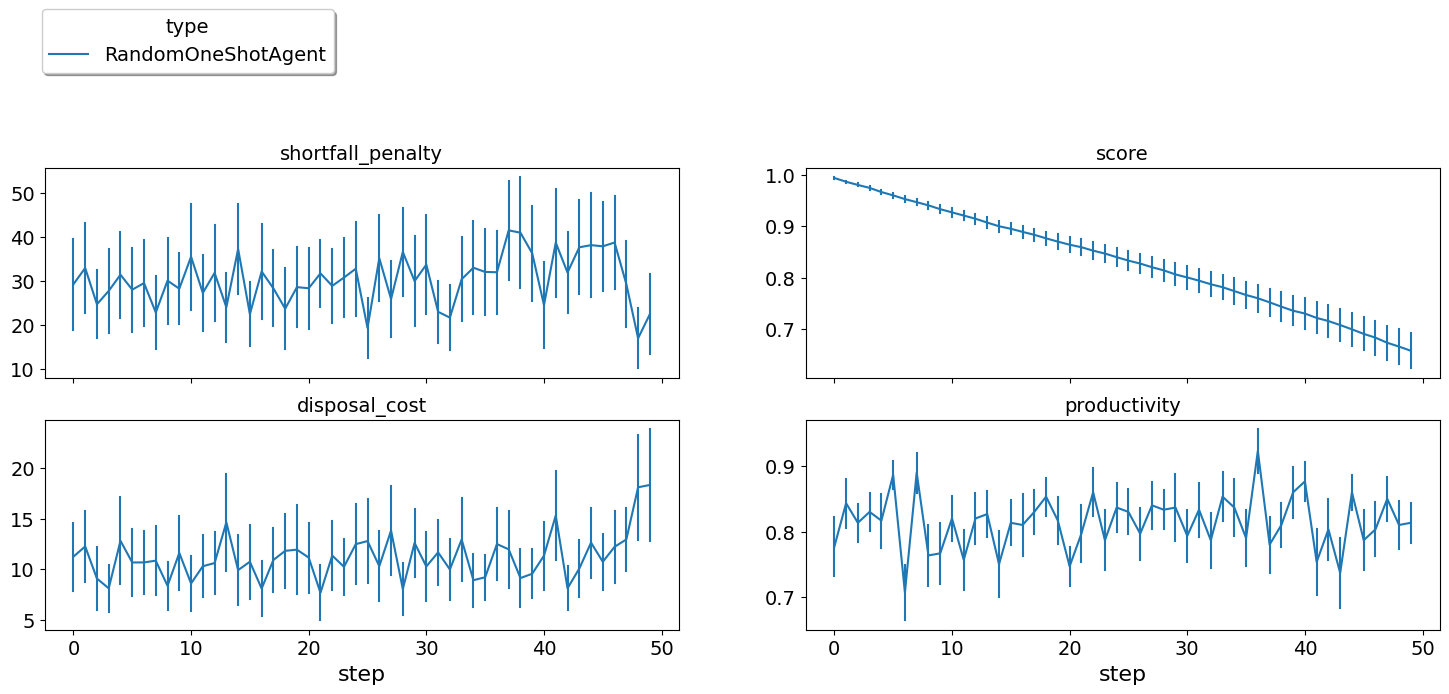
Still losing money but much less than before. The fact that other agents
made sense actually help our random agent get higher score. We can now
check the distribution of scores for our agent using the
score_summary method:
single_agent_runner.score_summary()
| type | score | count | mean | std | min | 25% | 50% | 75% | max | |
|---|---|---|---|---|---|---|---|---|---|---|
| 0 | RandomOneShotAgent | 0.65793 | 30.0 | 0.65793 | 0.185348 | 0.336662 | 0.517957 | 0.71734 | 0.780287 | 0.954094 |
You may have noticed that in some worlds multiple agents were of this
random type (having Ra in their names). We can check which agent in each
world was evaluated using the agents_per_world_of method:
single_agent_runner.agents_per_world_of(RandomOneShotAgent)
{'c0_RandomOneShotAgent_2/20240307H102843381773DM6bvVuL': [00Ra@0],
'c1_RandomOneShotAgent_2/20240307H102843395130xCD2AEh6': [09Ra@1],
'c2_RandomOneShotAgent_2/20240307H1028434068309wSk61hc': [03Ra@0],
'c3_RandomOneShotAgent_2/20240307H1028434193944qJf2mRi': [10Ra@1],
'c4_RandomOneShotAgent_2/20240307H1028434348725FI408iN': [02Ra@0],
'c5_RandomOneShotAgent_2/20240307H102843446517qRCJQARL': [06Ra@1],
'c6_RandomOneShotAgent_2/20240307H1028434575457oq3tBfI': [07Ra@1],
'c7_RandomOneShotAgent_2/20240307H1028434712435BW7DlOy': [10Ra@1],
'c8_RandomOneShotAgent_2/20240307H1028434854184xqGXFax': [12Ra@1],
'c9_RandomOneShotAgent_2/20240307H102843497378K9hijmDw': [09Ra@1]}
This random agent always loses money. Can we do better? Let’s start by an agent that does absolutely nothing.
An agent that does nothing
class MyOneShotDoNothing(OneShotPolicy):
"""My Agent that does nothing"""
def act(self, state):
return {}
""
single_agent_runner(MyOneShotDoNothing)
single_agent_runner.draw_worlds_of(MyOneShotDoNothing);
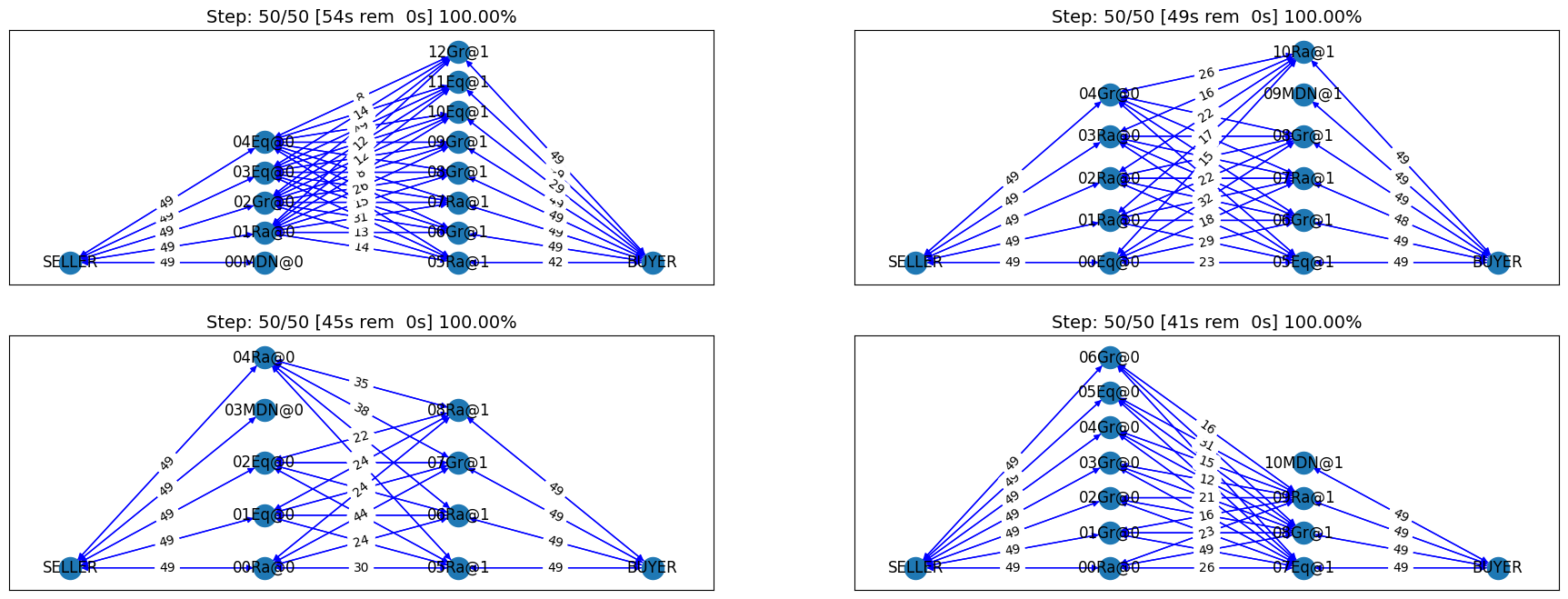
In all of the graph representing world simulations, we use short names
that represent the type of the agent. For example an agent named
03Ran@1 is an agent of type RandomOneShotAgent at production
level 1 that was the third agent to create. MDN here is a shorthand
for MyOneShotDoNothingAgent (we will usually remove OneShot and
Agent from the name before shortening it).
Notice how there is exactly one agent of our type (MDN) in each simulation. Moreover, these are in exactly the same palces in which the random agents evaluated were before. This is how we can guarantee that the comparison is fair.
Looking at the contracts-signed, we can see that none of the
concluded contracts involved our do-nothing agent. Nevertheless, these
agents still had exogenous contracts which means that they will lose
money. A do-nothing agent will usually lose money in this game.
Let’s check the scores of different agents to confirm:
single_agent_runner.score_summary()
| type | score | count | mean | std | min | 25% | 50% | 75% | max | |
|---|---|---|---|---|---|---|---|---|---|---|
| 0 | MyOneShotDoNothing | 0.716924 | 30.0 | 0.716924 | 0.128240 | 0.518197 | 0.587324 | 0.711476 | 0.852739 | 0.885616 |
| 1 | RandomOneShotAgent | 0.657930 | 30.0 | 0.657930 | 0.185348 | 0.336662 | 0.517957 | 0.717340 | 0.780287 | 0.954094 |
single_agent_runner.plot_stats(agg=False);
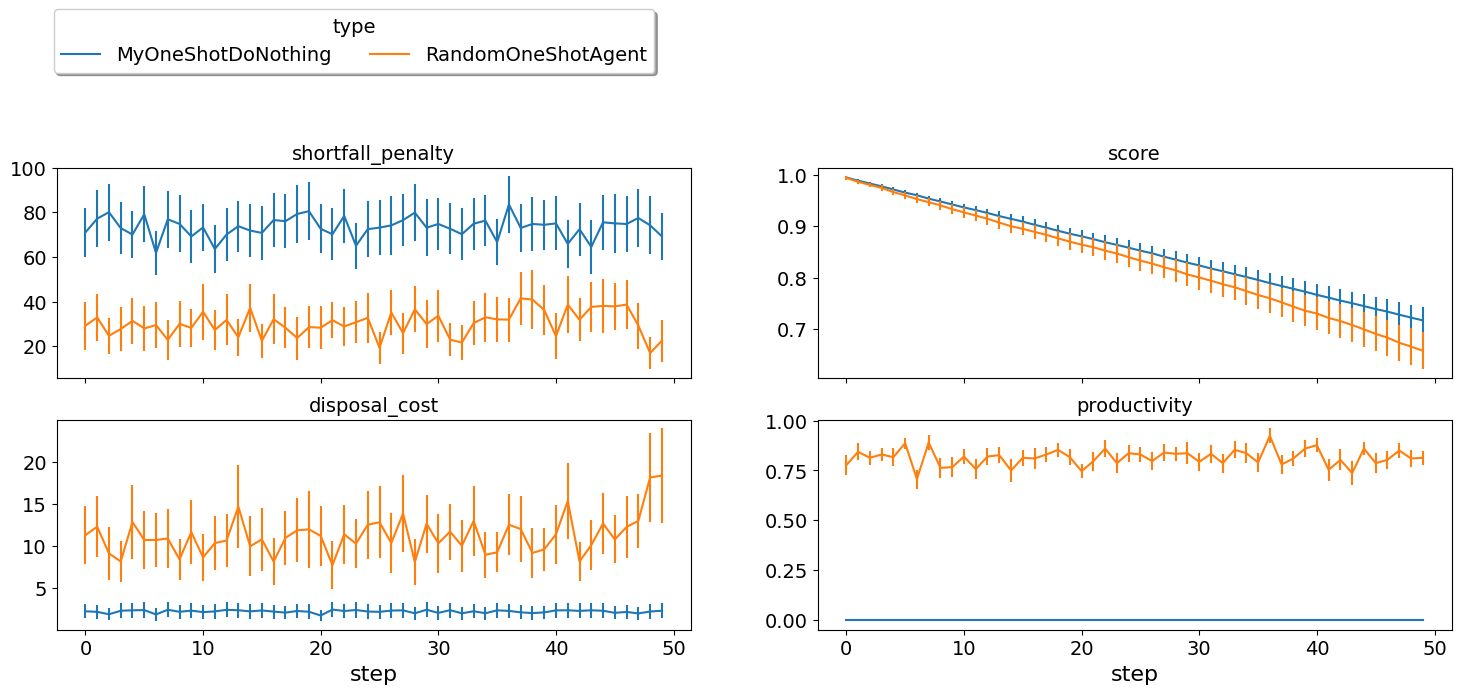
It is clear that our do-nothing agent always loses money and is even worse than acting randomly. That is because it cannot get any contracts from negotiation to satisfy its needs from the exogenous contracts but it still has to pay for disposal cost and shortfall penalty. This is by design. We set the penalties so that this is almost always the case to encourage agents to trade.
We can also have a look at the exogenous contracts that drive the market.
import math
from typing import Iterable
def analyze_contracts(worlds, exogenous_only=True):
"""
Analyzes the contracts signed in the given world
"""
dfs = []
for world in worlds:
dfs.append(pd.DataFrame.from_records(world.saved_contracts))
data = pd.concat(dfs)
if exogenous_only:
data = data.loc[
(data["seller_name"] == "SELLER") | (data["buyer_name"] == "BUYER"), :
]
return data.groupby(["seller_name", "buyer_name"])[["quantity", "unit_price"]].agg(
dict(quantity=("sum", "count"), unit_price="mean")
)
analyze_contracts(single_agent_runner.worlds_of())
| quantity | unit_price | |||
|---|---|---|---|---|
| sum | count | mean | ||
| seller_name | buyer_name | |||
| 04Eq@1 | BUYER | 2442 | 300 | 28.000000 |
| 05Eq@1 | BUYER | 5406 | 600 | 27.550000 |
| 05Ra@1 | BUYER | 4344 | 852 | 26.542254 |
| 06Eq@1 | BUYER | 2106 | 300 | 29.160000 |
| 06Gr@1 | BUYER | 6834 | 900 | 27.133333 |
| 06MDN@1 | BUYER | 1371 | 150 | 28.200000 |
| 06Ra@1 | BUYER | 6375 | 750 | 28.240000 |
| 07Eq@1 | BUYER | 2742 | 300 | 27.460000 |
| 07Gr@1 | BUYER | 13638 | 1500 | 27.752000 |
| 07MDN@1 | BUYER | 774 | 150 | 27.860000 |
| 07Ra@1 | BUYER | 3630 | 744 | 27.229839 |
| 08Eq@1 | BUYER | 5460 | 600 | 27.780000 |
| 08Gr@1 | BUYER | 8766 | 1200 | 27.085000 |
| 08Ra@1 | BUYER | 10638 | 1200 | 28.075000 |
| 09Gr@1 | BUYER | 4668 | 888 | 28.250000 |
| 09MDN@1 | BUYER | 2382 | 300 | 26.990000 |
| 09Ra@1 | BUYER | 9996 | 1200 | 27.562500 |
| 10Eq@1 | BUYER | 2910 | 480 | 27.412500 |
| 10Gr@1 | BUYER | 3054 | 546 | 28.241758 |
| 10MDN@1 | BUYER | 2817 | 300 | 27.930000 |
| 10Ra@1 | BUYER | 4341 | 600 | 27.715000 |
| 11Eq@1 | BUYER | 4182 | 600 | 27.690000 |
| 11Gr@1 | BUYER | 2178 | 300 | 29.160000 |
| 11Ra@1 | BUYER | 1890 | 300 | 29.440000 |
| 12Gr@1 | BUYER | 4320 | 600 | 27.930000 |
| 12MDN@1 | BUYER | 1143 | 150 | 28.480000 |
| 12Ra@1 | BUYER | 4023 | 450 | 28.360000 |
| 13Ra@1 | BUYER | 4824 | 600 | 29.290000 |
| SELLER | 00Eq@0 | 9894 | 1200 | 9.940000 |
| 00Gr@0 | 2658 | 300 | 10.260000 | |
| 00MDN@0 | 1338 | 150 | 10.100000 | |
| 00Ra@0 | 12636 | 1350 | 9.940000 | |
| 01Eq@0 | 5304 | 600 | 9.930000 | |
| 01Gr@0 | 8532 | 900 | 9.893333 | |
| 01Ra@0 | 13176 | 1500 | 10.064000 | |
| 02Eq@0 | 11064 | 1200 | 10.035000 | |
| 02Gr@0 | 7554 | 900 | 9.893333 | |
| 02MDN@0 | 1317 | 150 | 10.020000 | |
| 02Ra@0 | 7059 | 750 | 10.108000 | |
| 03Eq@0 | 7608 | 900 | 10.013333 | |
| 03Gr@0 | 8688 | 900 | 10.133333 | |
| 03MDN@0 | 1446 | 150 | 10.220000 | |
| 03Ra@0 | 9660 | 1050 | 10.145714 | |
| 04Eq@0 | 10392 | 1200 | 9.985000 | |
| 04Gr@0 | 10854 | 1200 | 9.960000 | |
| 04Ra@0 | 2352 | 300 | 9.840000 | |
| 05Eq@0 | 5448 | 600 | 9.850000 | |
| 05Gr@0 | 8400 | 900 | 9.986667 | |
| 06Eq@0 | 2904 | 300 | 9.720000 | |
| 06Gr@0 | 2400 | 300 | 10.340000 | |
| 06Ra@0 | 2898 | 300 | 10.120000 | |
| 07Ra@0 | 2760 | 300 | 10.160000 | |
There are few things to note about the distribution of the exogenous contracts:
The unit price of the raw material is always lower than that of the final product. This is the source of profitability in this market.
Each agent has a different mean and standar deviation for the quantities in its exogenous contracts. This means that different agents will have different utility functions but these utility functions for different steps are related because the exogenous contract is sampled from some common distribution for each agent for all the steps which makes learning more useful in the game.
Building your own agent
A one-shot agent needs only to do negotiation. The simplest possible
version (MyDoNothingAgent above) just responded to offers from its
partners and proposed new offers to them.
Looking at the graph for the world simulation, we can see immediately some features of the one-shot simulation that are not replicated in the full SCML game:
All negotiation requests are accepted. In fact in the one-shot game, the agent need not consider requesting negotiations or deciding the negotiation agenda as the system takes care of this ensuring that on every simulated day every agent is negotiating with its suppliers and or consumers about trade on that day (and only that day).
Contracts in the one-shot game are always executed (despite not showing that in the graph). There is no concept of a breach. Failure to honor contracts is instead penalized monetarily. Contracts are also never cancelled or nullified. This greatly simplifies the problem as the agent does not need to keep track of contract execution.
Production is too fast that it does not affect the agent reasoning. In the terminology to be presented in the following tutorial, there is no need for an explicit production strategy.
There is no need to consider future negotiations while reasoning about a the current set of negotiations. This greatly simplifies agent design as there is no long-term planning. In the terminology to be presented in the following section, there is no need for a trading strategy
Your AWI
As described in the previous tutorial, your agent can sense and act in the simulation by accessing methods and properties of its AWI which is accessible at any time as:
self.awi
You can see all of these methods and properties specific for the OneShotAWI and its descendents here.
Your ufun
The Oneshot game has the advantage that it is possible at the end of each simulation step (day) to calculate exactly the profit you will be getting for the set of contracts you have (either through negotiation or as exogenous contracts). We provide a utility function class (OneShotUtilityFunction which can be used normally as any NegMAS UtilityFunction. This ufun is available to your all the time (a new one is created for each simulation step) and is accessible as:
self.ufun
The most important services this ufun class provides for you are the following:
from_offers: This method receives a list of outcomes and a list of booleans indicating whether each of them is for buying or for selling. It returns to you the profit you will get if all of these outcomes and nothing else became contracts. An outcome is just a tuple (quantity, delivery time, unit price). You can use this callback during negotiation to judge hypothetical agreements with your partners.from_contracts: This method is the same asfrom_offersbut it receives a list ofContractobjects. It is useful after all negotiations are finished to calculate the profit you will be getting for this step.is_breach: will tell you whether or not getting the given total input and output quantities will make you cause a breach. Notice that breaches are expected in the OneShot track as any mismatch in the quantities of inputs and outputs will constitute a breach.breach_level: returns a value between zero and one specifying the level of breach that will be recorded for a given total input and output quantities.find_limit: finds either the maximum or the minimum possible profit (minimum profit is maximm loss) attainable in the current simulation step (day). This is useful when you want to normalize utility values between zero and one. Two of the agents we will develop during this tutorial will use this feature.max_utility,min_utility: give the maximum and minimum utilities/profits attainable. Note that you must prepare them by callingfind_limit. We will go into how to do that later.best,worst: give more information about the cases of maximum and minimum profit (i.e. the total input and output quantity needed, the prodcible quantity, best possible prices for buying and selling, etc). Again, these are not available except after callingfind_limit.
Your callbacks
Your agent needs to implement methods that are called by the system at various time during the negotiation. You can find a full list in the game description.
The most important ones are:
init()called once at the beginning of the simulation (i.e. before the first day starts). At this point, your AWI is set but you should not assume anything else.before_step()called at the beginning of every day. At this point, yourufunis set and market information is available.step()called at the end of every day. You can use this to analyze what happened during the day and modify your strategy in the future.on_negotiation_success()/on_negotiation_failure()called after each negotiation is concluded to let you know what happened in it.Depending on your base-class, you will also need to implement methods that allow you to control negotiations. These will be explained in details in the following sections but here is a summary:
OneShotAgent If your agent is based on
OneShotAgent, you will get apropose()call when you need to offer something to one of our partners during negotiation andrespond()when asked to respond to one of its offers.OneShotSyncAgent If your agent is based on
OneShotSyncAgentyou will get a call tofirst_proposals()once every day to set your first proposal in all negotiations and acounter_all()call to counter offers from your partners. The system will try to always give you one offer from each partner in thecounter_all()call but that is not guaranteed and sometimes it may be called with a subset of the offers.OneShotPolicy This is very similar to
OneShotSyncAgentwith only one callbackact()which receives the AWI (asstate) and returns a mapping from each partner to anSAOResponse(i.e. acceptance, ending negotiation, or rejection and a counter offer). This is mostly there to help build RL agents (see next tutorial).OneShotSingleAgreementAgent If your agent is based on
OneShotSingleAgreementAgentyou will have to implementis_acceptable()to decide if a given offer is acceptable to you,best_offer()to find the best offer in a given negotiation for your agent andis_better()to compare two offers. Once you implement these, the agent will implement all callback for you trying to get a single agreement that maximizes your utility. Note that, again, it is not guaranteed that you will get a single agreement at the end but the system will try its best to achieve that.
Now we can start working on our agent.
We will discuss these different base classes and basing your agent in each of them in more details in what follows.
OneShotAgent
This is the base class of all agents for SCML-OneShot. Both
SyncOneShotAgent and SingleAgreementOneShotAgent inherit from
this class and provide support for a simplified way of developing your
agent (or so we think). It is perfectly OK to use OneShotAgent
directly as the base of your agent.
As discussed earlier, you will receive a propose and respond
call for each round in each negotiation. The propose method receives
the negotiation state (an object of the type
`SAOState <https://negmas.readthedocs.io/en/latest/api/negmas.sao.SAOState.html>`__
including among other things the current negotiation step, relative
time, last offer, etc) and is required to return an Outcome which is
just a tuple of a quantity, delivery time (must be this simulation step)
and unit price, in that order (See `negmas
documentation <https://negmas.readthedocs.io/en/latest>`__) as an offer.
The respond method receives a negotiation state and an offer
(Outcome) from the opponent and needs to respond to it by a decision
from the `ResponseType
enumeration <https://negmas.readthedocs.io/en/latest/api/negmas.gb.ResponseType.html>`__
(REJECT_OFFER, ACCEPT_OFFER, and END_NEGOTIATION). Other
than these two negotiation related callbacks, the agent receives an
init call just after it joins the simulatin and a
before_step/step call before/after each simulation step. The
agent is also informed about failure/success of negotiations through the
on_negotiation_success/on_negotiation_failure callbacks. That is
all. A one-shot agent needs to only think about what should it do to
respond to each of these seven callbacks. All of these callbacks except
propose and respond are optional.
Simple OneShotAgent
We have already seen how to develop a do-nothing agent using the
OneShotAgent class. Let’s try to develop some more meaningful agent
using the same base class.
class SimpleAgent(OneShotAgent):
"""A greedy agent based on OneShotAgent"""
def propose(self, negotiator_id: str, state) -> "Outcome":
return self.best_offer(negotiator_id)
def respond(self, negotiator_id, state, source=""):
offer = state.current_offer
my_needs = self._needed(negotiator_id)
if my_needs <= 0:
return ResponseType.END_NEGOTIATION
return (
ResponseType.ACCEPT_OFFER
if offer[QUANTITY] <= my_needs
else ResponseType.REJECT_OFFER
)
def best_offer(self, negotiator_id):
my_needs = self._needed(negotiator_id)
if my_needs <= 0:
return None
ami = self.get_nmi(negotiator_id)
if not ami:
return None
quantity_issue = ami.issues[QUANTITY]
offer = [-1] * 3
offer[QUANTITY] = max(
min(my_needs, quantity_issue.max_value), quantity_issue.min_value
)
offer[TIME] = self.awi.current_step
offer[UNIT_PRICE] = self._find_good_price(ami)
return tuple(offer)
def _find_good_price(self, ami):
"""Finds a good-enough price."""
unit_price_issue = ami.issues[UNIT_PRICE]
if self._is_selling(ami):
return unit_price_issue.max_value
return unit_price_issue.min_value
def is_seller(self, negotiator_id):
return negotiator_id in self.awi.current_negotiation_details["sell"].keys()
def _needed(self, negotiator_id=None):
return (
self.awi.needed_sales
if self.is_seller(negotiator_id)
else self.awi.needed_supplies
)
def _is_selling(self, ami):
return ami.annotation["product"] == self.awi.my_output_product
Let’s see how well did this agent behave:
single_agent_runner(SimpleAgent)
single_agent_runner.score_summary()
| type | score | count | mean | std | min | 25% | 50% | 75% | max | |
|---|---|---|---|---|---|---|---|---|---|---|
| 2 | SimpleAgent | 0.905806 | 30.0 | 0.905806 | 0.243713 | 0.256752 | 0.857049 | 0.969827 | 1.038091 | 1.176166 |
| 0 | MyOneShotDoNothing | 0.716924 | 30.0 | 0.716924 | 0.128240 | 0.518197 | 0.587324 | 0.711476 | 0.852739 | 0.885616 |
| 1 | RandomOneShotAgent | 0.657930 | 30.0 | 0.657930 | 0.185348 | 0.336662 | 0.517957 | 0.717340 | 0.780287 | 0.954094 |
we can check how the score and other statistics of this type of agent changes over time:
single_agent_runner.plot_stats(agg=False);
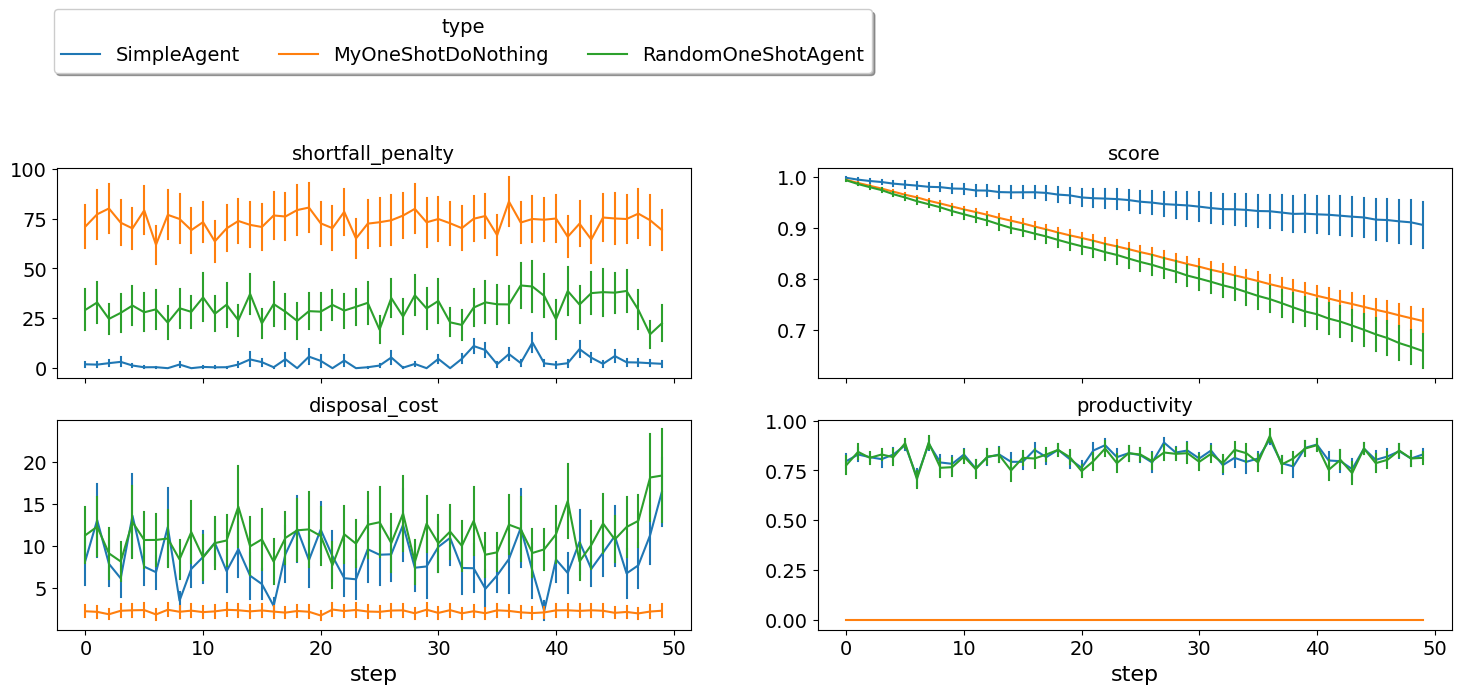
This simple agent is better than the random agent and our do-nothing agent. It can make around 1% profit. Let’s understand how it works:
The main idea of this agent is pretty simple. It tries to secure as much of its needs (sales/supplies) as possible in every negotiation at the best possible price for itself.
To achieve this goal, the agent uses the fact that the AWI already
keeps track of this information as needed_supplies and
needed_sales. Therefore, it defines a helper that calculates the
amount it needs by subtracting the exogenous quantity it has from the
amount it secured
def _needed(self):
self.awi.needed_sales if self.is_seller(negotiator_id) else self.awi.needed_supplies
where it uses needed_sales if the current negotiation is for selling
and needed_supplies otherwise. Now that the agent can calculate how
much it needs to buy/sell, it implements the negotiation related
call-backs (propose and respond).
Here is the full implementation of propose:
def propose(self, negotiator_id: str, state) -> "Outcome":
return self.best_offer(negotiator_id)
The agent is always offering its best offer which is calculated in the
best_offer method to be discussed later. It does not conceed at all.
Responding to opponent offers is also simple:
it starts by calculating its needs using the helper
_needed, and ends the negotiation if it needs no more sales/supplies
my_needs = self._needed()
if my_needs <= 0:
return ResponseType.END_NEGOTIATION
If the offered quantity is less than its needs, accept the offer. Otherwise reject the offer.
return (
ResponseType.ACCEPT_OFFER
if offer[QUANTITY] <= my_needs
else ResponseType.REJECT_OFFER
)
Most of the code is in the best_offer method which calculates the
best offer for a negotiation given the agreements reached so far.
Let’s check it line by line:
The agent checks its needs and returns
Noneending the negotiation if it needs no more sales/supplies. We also get access to the AMI.
my_needs = self._needed()
if my_needs <= 0:
return None
ami = self.get_nmi(negotiator_id)
if not ami:
return None
It then finds out the
Issueobjects corresponding to the quantity and unit-price for this negotiation and initializes an offer (we have 3 issues)
quantity_issue = ami.issues[QUANTITY]
unit_price_issue = ami.issues[UNIT_PRICE]
offer = [-1] * 3
The time is always the current step.
offer[TIME] = self.awi.current_step
The quantity to offer is simply the needs of the agent without mapped within the range of the quantities in the negotiation agenda (note that this may lead the agent to buy more than its needs).
offer[QUANTITY] = max(min(my_needs, quantity_issue.max_value), quantity_issue.min_value)
Finally, the unit price is the maximum possible unit price if the agent is selling otherwise it is the minimum possible price. Note that
is_selling()assumes that the agent will never find itself in a middle layer in a deep negotiation. We will alleviate this issue later.
if self._is_selling(ami):
offer[UNIT_PRICE] = unit_price_issue.max_value
else:
offer[UNIT_PRICE] = unit_price_issue.min_value
return tuple(offer)
A (suposedly) better greedy agent
One problem with our SimpleAgent is that it does not take price into
account in two ways:
When asked to
propose, it always proposes an offer with the best price for itself. It never concedes on prices. In many cases this will lead to disagreement.When asked to
respondto an offer, it does not even check the price. This may lead to bad agreements (i.e. very high buying prices/very low selling prices).
We will try to remedie both of these issues in the following agent:
class BetterAgent(SimpleAgent):
"""A greedy agent based on OneShotAgent with more sane strategy"""
def __init__(self, *args, concession_exponent=0.2, **kwargs):
super().__init__(*args, **kwargs)
self._e = concession_exponent
def respond(self, negotiator_id, state, source=""):
offer = state.current_offer
if offer is None:
return ResponseType.REJECT_OFFER
response = super().respond(negotiator_id, state, source)
if response != ResponseType.ACCEPT_OFFER:
return response
nmi = self.get_nmi(negotiator_id)
return (
response
if self._is_good_price(nmi, state, offer[UNIT_PRICE])
else ResponseType.REJECT_OFFER
)
def _is_good_price(self, nmi, state, price):
"""Checks if a given price is good enough at this stage"""
mn, mx = self._price_range(nmi)
th = self._th(state.step, nmi.n_steps)
# a good price is one better than the threshold
if self._is_selling(nmi):
return (price - mn) >= th * (mx - mn)
else:
return (mx - price) >= th * (mx - mn)
def _find_good_price(self, nmi):
"""Finds a good-enough price conceding linearly over time"""
state = nmi.state
mn, mx = self._price_range(nmi)
th = self._th(state.step, nmi.n_steps)
# offer a price that is around th of your best possible price
if self._is_selling(nmi):
return int(mn + th * (mx - mn))
else:
return int(mx - th * (mx - mn))
def _price_range(self, nmi):
"""Finds the minimum and maximum prices"""
mn = nmi.issues[UNIT_PRICE].min_value
mx = nmi.issues[UNIT_PRICE].max_value
return mn, mx
def _th(self, step, n_steps):
"""calculates a descending threshold (0 <= th <= 1)"""
return ((n_steps - step - 1) / (n_steps - 1)) ** self._e
Let’s see how well did this agent behave:
single_agent_runner(BetterAgent)
single_agent_runner.score_summary()
| type | score | count | mean | std | min | 25% | 50% | 75% | max | |
|---|---|---|---|---|---|---|---|---|---|---|
| 3 | SimpleAgent | 0.905806 | 30.0 | 0.905806 | 0.243713 | 0.256752 | 0.857049 | 0.969827 | 1.038091 | 1.176166 |
| 0 | BetterAgent | 0.742522 | 30.0 | 0.742522 | 0.355723 | 0.087694 | 0.320086 | 0.871921 | 0.978388 | 1.181927 |
| 1 | MyOneShotDoNothing | 0.716924 | 30.0 | 0.716924 | 0.128240 | 0.518197 | 0.587324 | 0.711476 | 0.852739 | 0.885616 |
| 2 | RandomOneShotAgent | 0.657930 | 30.0 | 0.657930 | 0.185348 | 0.336662 | 0.517957 | 0.717340 | 0.780287 | 0.954094 |
It seems that BetterAgent is much worse than the SimpleAgent. It
is as good as the randomly behaving agent!! We failed :-(
Still, Let’s dive into the agent and analyze how it works:
The main idea in BetterAgent is to treat the price issue
separately to avoid the two issues presented earlier:
Never conceding during proposal This is solved in the
proposemethod by just overriding the price with agood-enoughprice:offer[UNIT_PRICE] = self._find_good_price(self.get_nmi(negotiator_id), state)
As an aside, notice that we needed to convert the offer to a list in order to overwrite the price then back into a tuple to send it to the partner.
Never checking prices of offers This is solved in the
respondmethod by checking whether or not the price offered is agood-enoughprice:return ( response if self._is_good_price(ami, state, offer[UNIT_PRICE]) else ResponseType.REJECT_OFFER )
As we will see later, this is not much of an issue in SCML OneShot 2023 though.
What we mean by a good-enough price is defined in _is_good_price
and _find_good_price methods. Both start by getting the limits of
the unit-price in the negotiation agenda and a threshold value th:
mn, mx = self._price_range(ami, state)
th = self._th(mn, mx, state.step, ami.n_steps)
The price range is clear enough. For the threshold th is a value
that starts at \(1.0\) and goes down toward \(0.0\) over the
negotiation time under the control of an agent specific parameter _e
called the concession exponent. Let’s see how does this look for
different concession exponents:
x = np.arange(20)
fig = plt.figure()
for e in [0.1, 0.2, 1.0, 5, 10]:
a = BetterAgent(concession_exponent=e)
y = [a._th(i, 20) for i in x]
plt.plot(x, y, label=f"Concession Exponent: {e}")
plt.xlabel("Step (Of 20)")
plt.ylabel("Threshold $th$")
plt.legend()
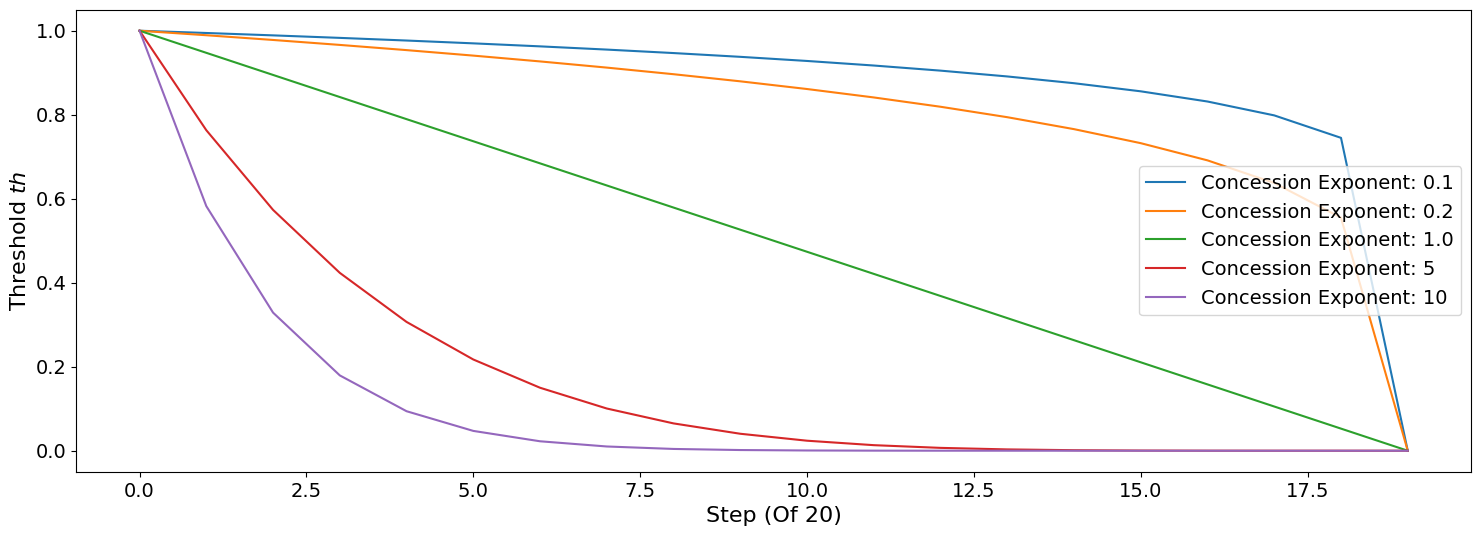
You can see that the smaller the exponent the more hard-headed will
the agent be. Setting the concession exponent to \(0\) will recover
the behavior of the SimpleAgent in offering but will make it
insisting on an unrealistic best price when responding to partner offers
(can you see why?) which is definitely a bad idea. Setting it to
\(\inf\) will recover the behavior of SimpleAgent in responding
to offers but will make its offers least favorable for itself in terms
of price (can you see why?)
Given this threshold function, we can now define is_good_price and
_find_good_price:
_is_good_pricesimply compares the price given to it to the current threshold defined by multiplyingthby the price rangemx - mnWhen selling this is achieved by comparing the difference between the price and minimum price to the curren threshold:
return (price - mn) >= th * (mx - mn)
You can check that this will give the maximum unit price in the first step and gradually goes down to the minimum unit price in the last step (
n_steps - 1)When buying we go the other way around (starting at minimum price and going up over time to the maximum price):
return (mx - price) >= th * (mx - mn)
_find_good_priceworks in the same fashion but rather than checking the goodness of a price, it simply uses the threshold to generate agood-enoughprice:if self._is_selling(ami): return mn + th * (mx - mn) else: return mx - th * (mx - mn)
Why did not this approach work
As you may have noticed, BetterAgent is not relly better than
SimpleAgent. why? The main reason is that price does not really
matter that much in the settings for SCML 2024 OneShot because the price
range is limited to only two consecutive values (e.g. (9, 10)) which
increases the relative importance of avoiding penalties by matching
demand and supply.
Thinking about other negotiations
So far, our agent behaved indepdendently in each negotiation without
considering what is happening in the others (except when one of them
completes changing the amount secured). A simple way to consider
other negotiations is to use the prices offered in them to limit our
concessions. The following agent implements this idea
class AdaptiveAgent(BetterAgent):
"""Considers best price offers received when making its decisions"""
def before_step(self):
self._best_selling, self._best_buying = 0.0, float("inf")
def respond(self, negotiator_id, state, source=""):
"""Save the best price received"""
offer = state.current_offer
response = super().respond(negotiator_id, state, source)
nmi = self.get_nmi(negotiator_id)
if self._is_selling(nmi):
self._best_selling = max(offer[UNIT_PRICE], self._best_selling)
else:
self._best_buying = min(offer[UNIT_PRICE], self._best_buying)
return response
def _price_range(self, nmi):
"""Limits the price by the best price received"""
mn, mx = super()._price_range(nmi)
if self._is_selling(nmi):
mn = max(mn, self._best_selling)
else:
mx = min(mx, self._best_buying)
return mn, mx
Let’s see how well did this agent behave:
single_agent_runner(AdaptiveAgent)
single_agent_runner.score_summary()
| type | score | count | mean | std | min | 25% | 50% | 75% | max | |
|---|---|---|---|---|---|---|---|---|---|---|
| 4 | SimpleAgent | 0.905806 | 30.0 | 0.905806 | 0.243713 | 0.256752 | 0.857049 | 0.969827 | 1.038091 | 1.176166 |
| 0 | AdaptiveAgent | 0.756491 | 30.0 | 0.756491 | 0.367015 | 0.064872 | 0.318639 | 0.897773 | 1.008595 | 1.181927 |
| 1 | BetterAgent | 0.742522 | 30.0 | 0.742522 | 0.355723 | 0.087694 | 0.320086 | 0.871921 | 0.978388 | 1.181927 |
| 2 | MyOneShotDoNothing | 0.716924 | 30.0 | 0.716924 | 0.128240 | 0.518197 | 0.587324 | 0.711476 | 0.852739 | 0.885616 |
| 3 | RandomOneShotAgent | 0.657930 | 30.0 | 0.657930 | 0.185348 | 0.336662 | 0.517957 | 0.717340 | 0.780287 | 0.954094 |
Not even as good as BetterAgent, at least in this simulation. One
possiblity here is that the agent became too hard-headed again because
now whenever it sees a good price on one negotiation, it insists on it
for all the rest. This may not be a good idea sometimes as it may lead
to more disagreements. In general the agent must balance getting good
prices with matching its input and output quantities.
Let’s just now see what happens if we are generous enough to grant our partner the best price for them half of the time. This should work because price is not important in SCML-OneShot
class GenerousAgent(SimpleAgent):
"""A greedy agent that always gives the best price for the opponent"""
def _find_good_price(self, nmi):
"""Finds a good-enough price conceding linearly over time"""
i = nmi.issues[UNIT_PRICE]
return i.min_value if random.random() < 0.5 else i.max_value
single_agent_runner(GenerousAgent);
single_agent_runner.score_summary()
| type | score | count | mean | std | min | 25% | 50% | 75% | max | |
|---|---|---|---|---|---|---|---|---|---|---|
| 5 | SimpleAgent | 0.905806 | 30.0 | 0.905806 | 0.243713 | 0.256752 | 0.857049 | 0.969827 | 1.038091 | 1.176166 |
| 2 | GenerousAgent | 0.850194 | 30.0 | 0.850194 | 0.240858 | 0.260795 | 0.819196 | 0.886290 | 0.989907 | 1.171139 |
| 0 | AdaptiveAgent | 0.756491 | 30.0 | 0.756491 | 0.367015 | 0.064872 | 0.318639 | 0.897773 | 1.008595 | 1.181927 |
| 1 | BetterAgent | 0.742522 | 30.0 | 0.742522 | 0.355723 | 0.087694 | 0.320086 | 0.871921 | 0.978388 | 1.181927 |
| 3 | MyOneShotDoNothing | 0.716924 | 30.0 | 0.716924 | 0.128240 | 0.518197 | 0.587324 | 0.711476 | 0.852739 | 0.885616 |
| 4 | RandomOneShotAgent | 0.657930 | 30.0 | 0.657930 | 0.185348 | 0.336662 | 0.517957 | 0.717340 | 0.780287 | 0.954094 |
We finally kind of recover the performance of the SimpleAgent.
That is how unimportant reasoning about prices is for SCML-OneShot.
The situation changes dramatically in SCML-Std though as prices become
more important.
OneShotSyncAgent
One problem that plagued all of our agents so far is that they have to
make decisions (respond, propose) about negotiations on the
spot. This makes it difficult to consider all other negotiations
while making decisions.
Because the utility function is defined for a complete set of
negotiation agreements and not for any single negotiation by itself,
it makes sense to try to make decisions centrally by collecting
offers from partners then responding to all of them at once. It is
possible to do that by utilizing the response type ResponseType.WAIT
supported by NegMAS but this entails a lot of house-keeping.
To simplify this task, we provide another base class for agents that does all of this house keeping for you exposing a simple interface that syncrhonizes all negotiations (as much as allowed by the underlying platform). The main goal of this base agent is to allow the developer to think about all negotiations together but it has some important caveats which we will discuss later. Here is an example of writing the do-nothing agent in this form:
class MySyncOneShotDoNothing(OneShotSyncAgent):
"""My Agent that does nothing"""
def counter_all(self, offers, states):
"""Respond to a set of offers given the negotiation state of each."""
return dict()
def first_proposals(self):
"""Decide a first proposal on every negotiation.
Returning None for a negotiation means ending it."""
return dict()
single_agent_runner(MySyncOneShotDoNothing)
single_agent_runner.draw_worlds_of(MySyncOneShotDoNothing);
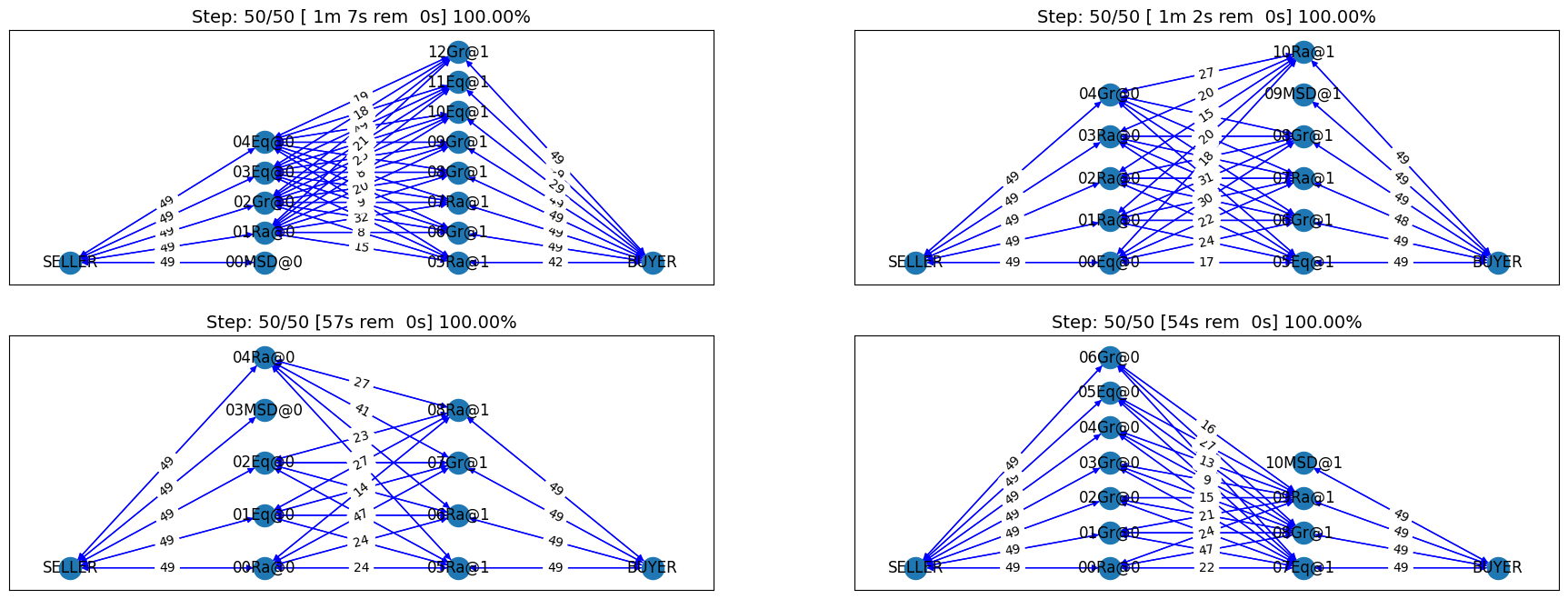
As you can see, in this case, we need to override counter_all to
counter offers received from all the partners and first_proposals
to decide a first offer for each partner.
Other than these two negotiation related callbacks, the agent receives
an init call just after it joins the simulatin and a step call
after each step. The agent is also informed about failure/success of
negotiations through the
on_negotiation_success/on_negotiation_failure callbacks. That is
all. A one-shot agent needs to only think about what should it do to
respond to each of these six callbacks. All of these callbacks except
counter_all and first_proposals are optional.
A not so-good SyncAgent
The main advantage of using the OneShotSyncAgent is that you do not
need to keep track of state variables (like secured, _supplies
and _sales used earlier) and you have a common place to make your
decisions about all negotiations at the same time. Here is a simple
greedy agent using this approach.
class NaiveSyncAgent(OneShotSyncAgent):
"""A greedy agent based on OneShotSyncAgent"""
def __init__(self, *args, threshold=0.5, **kwargs):
super().__init__(*args, **kwargs)
self._threshold = threshold
def before_step(self):
super().before_step()
self.ufun.find_limit(True)
self.ufun.find_limit(False)
def first_proposals(self):
"""Decide a first proposal on every negotiation.
Returning None for a negotiation means ending it."""
return dict(
zip(
self.negotiators.keys(),
(self.best_offer(_) for _ in self.negotiators.keys()),
)
)
def counter_all(self, offers, states):
"""Respond to a set of offers given the negotiation state of each."""
# Initialize all responses by my best options
responses = {
k: SAOResponse(ResponseType.REJECT_OFFER, v)
for k, v in self.first_proposals().items()
}
# find how much quantity do I still need
my_needs = self._needed()
# Am I a seller?
is_selling = (self._is_selling(self.get_nmi(_)) for _ in offers.keys())
# sort my offres by price (descendingly/ascendingly for a seller/buyer)
sorted_offers = sorted(
zip(offers.values(), is_selling),
key=lambda x: (-x[0][UNIT_PRICE]) if x[1] else x[0][UNIT_PRICE],
)
# greedly choose offers until my needs are satsified
secured, outputs, chosen = 0, [], dict()
for i, k in enumerate(offers.keys()):
offer, is_output = sorted_offers[i]
secured += offer[QUANTITY]
if secured >= my_needs:
break
chosen[k] = offer
outputs.append(is_output)
# calculate the utility of selected offers
u = self.ufun.from_offers(tuple(chosen.values()), tuple(outputs))
# if the utility of selected offers is high enough, accept them
rng = self.ufun.max_utility - self.ufun.min_utility
threshold = self._threshold * rng + self.ufun.min_utility
if u >= threshold:
for k, v in chosen.items():
responses[k] = SAOResponse(ResponseType.ACCEPT_OFFER, None)
return responses
def best_offer(self, negotiator_id):
my_needs = self._needed(negotiator_id)
if my_needs <= 0:
return None
ami = self.get_nmi(negotiator_id)
if not ami:
return None
quantity_issue = ami.issues[QUANTITY]
offer = [-1] * 3
offer[QUANTITY] = max(
min(my_needs, quantity_issue.max_value), quantity_issue.min_value
)
offer[TIME] = self.awi.current_step
offer[UNIT_PRICE] = self._find_good_price(ami)
return tuple(offer)
def is_seller(self, negotiator_id):
return negotiator_id in self.awi.current_negotiation_details["sell"].keys()
def _needed(self, negotiator_id=None):
return (
self.awi.needed_sales
if self.is_seller(negotiator_id)
else self.awi.needed_supplies
)
def _find_good_price(self, nmi):
"""Finds a good-enough price conceding linearly over time"""
if self._is_selling(nmi):
return nmi.issues[UNIT_PRICE].min_value
return nmi.issues[UNIT_PRICE].max_value
def _is_selling(self, ami):
return ami.annotation["product"] == self.awi.my_output_product
This agent shows a case of parameterizing your agent so that it can be tested with different hyper-parameters. You do that by passing whatever parameters you like as keyword arguments to the constctor:
def __init__(self, *args, threshold=0.3, **kwargs):
super().__init__(*args, **kwargs)
self._threshold = threshold
The one paramter we have is a threshold of utility relative to the maximum possile utility that we are willing to accept.
This agent also shows a case in which we use the built-in utility
function implemented by the system (see Section 2.3 of the game
description). This
ufun is accessible as ufun. By default the ufun will return the
profit in dollars for a given set of negotiation outcomes, offers,
agreements, or contracts. Note that the ufun assumes that what it is
given is the complete set of agreements and no others will be added to
them later. This value may be positive or negative (loss). In some
cases you need to get the utility value normalized to a range between
zero and one. This agent will do that. To do this normalization, we need
to know the value of maximum and minimum utilities. You can of course
solve the corresponding optimziation problem but we did that for you.
All you need is call find_limit and pass it a boolean (True for
calculating the highest possible utility and False for calculating
the lowest possible utility). To avoid doing this calculation
repeatedly, you should store the results in ufun.best or
ufun.worst for highest and lowest utility. After that, you can
access the maximum possible utility as max_utility and minimum
possible utility as min_utility. We do that in the before_step()
method (called at the beginning of every day):
def before_step(self):
super().init()
self.ufun.find_limit(True)
self.ufun.find_limit(False)
After this call, we can access maximum_utility, minimum_utility,
best, worst members of the ufun. As explained earlier, best
and worst give extra information about the conditions for achieving
maximum and minimum utility.
We need to implement two methods: first_proposals (to generate a
good first proposal for each negotiation) and counter_all (for
countering a set of offers). We inherit from SimpleAgent in order to
get access to best_offer and _is_selling methods (we could have
repeated them here again of course. Note that, because of the way
inheritence works in python, we must inherit from OneShotSyncAgent
before SimpleAgent.
The first set of proposals in first_proposals is simply the
best_offer for each negotiation which is calculated using this
generator expression:
(self.best_offer(_) for _ in self.negotiators.keys())
Almost all the code now resides in the counter_all method. We will
go over it here:
We start by initializing our response by the best offer for each negotiation using
first_proposalsand calculating our needs using_needed
responses = {
k: SAOResponse(ResponseType.REJECT_OFFER, _)
for k, v in self.first_proposals().items()
}
my_needs = self._needed(None)
We then sort the offers so that earlier offers have better prices for us. For sell offers, this means descendingly and for buy offers ascendingly.
is_selling = (self._is_selling(self.get_nmi(_)) for _ in offers.keys())
sorted_offers = sorted(
zip(offers.values(), is_selling),
key=lambda x: (-x[0][UNIT_PRICE]) if x[1] else x[0][UNIT_PRICE],
)
We greedily find a set of offers that satisfy all our needs (or as much as possible from them).
secured, outputs, chosen = 0, [], dict()
for i, k in enumerate(offers.keys()):
offer, is_output = sorted_offers[i]
secured += offer[QUANTITY]
if secured >= my_needs:
break
chosen[k] = offer
outputs.append(is_output)
Finally, we calculate the utility of accepting these and only these offers and accept the chosen offers if they provide 70% of the maximum possible utility. Otherwise, we reject all offers sending the default
best_offervalue back.
u = self.ufun.from_offers(tuple(chosen.values()), tuple(outputs))
rng = self.ufun.max_utility - self.ufun.min_utility
threshold = self._threshold * rng + self.ufun.min_utility
if u >= threshold:
for k, v in chosen.items():
responses[k] = SAOResponse(ResponseType.ACCEPT_OFFER, None)
return responses
Let’s see how did it do:
single_agent_runner(NaiveSyncAgent)
single_agent_runner.score_summary()
| type | score | count | mean | std | min | 25% | 50% | 75% | max | |
|---|---|---|---|---|---|---|---|---|---|---|
| 7 | SimpleAgent | 0.905806 | 30.0 | 0.905806 | 0.243713 | 0.256752 | 0.857049 | 0.969827 | 1.038091 | 1.176166 |
| 2 | GenerousAgent | 0.850194 | 30.0 | 0.850194 | 0.240858 | 0.260795 | 0.819196 | 0.886290 | 0.989907 | 1.171139 |
| 0 | AdaptiveAgent | 0.756491 | 30.0 | 0.756491 | 0.367015 | 0.064872 | 0.318639 | 0.897773 | 1.008595 | 1.181927 |
| 1 | BetterAgent | 0.742522 | 30.0 | 0.742522 | 0.355723 | 0.087694 | 0.320086 | 0.871921 | 0.978388 | 1.181927 |
| 4 | MySyncOneShotDoNothing | 0.717437 | 30.0 | 0.717437 | 0.128590 | 0.518223 | 0.587364 | 0.712251 | 0.853799 | 0.885967 |
| 3 | MyOneShotDoNothing | 0.716924 | 30.0 | 0.716924 | 0.128240 | 0.518197 | 0.587324 | 0.711476 | 0.852739 | 0.885616 |
| 6 | RandomOneShotAgent | 0.657930 | 30.0 | 0.657930 | 0.185348 | 0.336662 | 0.517957 | 0.717340 | 0.780287 | 0.954094 |
| 5 | NaiveSyncAgent | 0.578200 | 30.0 | 0.578200 | 0.288741 | 0.087481 | 0.308480 | 0.600469 | 0.810890 | 1.034915 |
Ok it works but you did not expect it to work well. right? We called it
Naive for a reason.
This base-class simplifies the job of the agent developer by providing a
single function (counter_all) in which to handle all offers it
receive (most of the time, remember that sometimes you will receive a
subset of the offers in the call). In principle the agent can then
decide to accept a few of these offers and keep negotiating.
The problem with this agent is that it defines a good offer independently for each negotiation which defeats the purpose of having the chance to decide centrally what to do for all negotiations. That is made even less effective by the fact that in SCML 2024, price does not matter that much. In the following section, we design a very simple alternative that tries to resolve this issue
A better SyncAgent
We start by defining a simple helper function that distributes a given quantity \(q\) over \(n\) partners.
def distribute(q: int, n: int) -> list[int]:
"""Distributes n values over m bins with at
least one item per bin assuming q > n"""
from numpy.random import choice
from collections import Counter
if q < n:
lst = [0] * (n - q) + [1] * q
random.shuffle(lst)
return lst
if q == n:
return [1] * n
r = Counter(choice(n, q - n))
return [r.get(_, 0) + 1 for _ in range(n)]
Here are few examples of how it would distribute \(10\) units over \(4\) partners
[distribute(10, 4) for _ in range(5)]
[[3, 2, 2, 3], [2, 2, 4, 2], [3, 3, 2, 2], [2, 4, 2, 2], [1, 3, 2, 4]]
[distribute(2, 4) for _ in range(5)]
[[1, 0, 0, 1], [1, 1, 0, 0], [0, 1, 0, 1], [0, 1, 1, 0], [0, 1, 1, 0]]
We will also need a helper function to find all subsets of a given set (powerset):
from itertools import chain, combinations
def powerset(iterable):
s = list(iterable)
return chain.from_iterable(combinations(s, r) for r in range(len(s) + 1))
class BetterSyncAgent(OneShotSyncAgent):
"""An agent that distributes its needs over its partners randomly."""
def distribute_needs(self) -> dict[str, int]:
"""Distributes my needs randomly over all my partners"""
dist = dict()
for needs, all_partners in [
(self.awi.needed_supplies, self.awi.my_suppliers),
(self.awi.needed_sales, self.awi.my_consumers),
]:
# find suppliers and consumers still negotiating with me
partner_ids = [_ for _ in all_partners if _ in self.negotiators.keys()]
partners = len(partner_ids)
# if I need nothing, end all negotiations
if needs <= 0:
dist.update(dict(zip(partner_ids, [0] * partners)))
continue
# distribute my needs over my (remaining) partners.
dist.update(dict(zip(partner_ids, distribute(needs, partners))))
return dist
def first_proposals(self):
# just randomly distribute my needs over my partners (with best price for me).
s, p = self._step_and_price(best_price=True)
distribution = self.distribute_needs()
d = {k: (q, s, p) if q > 0 else None for k, q in distribution.items()}
return d
def counter_all(self, offers, states):
response = dict()
# process for sales and supplies independently
for needs, all_partners, issues in [
(
self.awi.needed_supplies,
self.awi.my_suppliers,
self.awi.current_input_issues,
),
(
self.awi.needed_sales,
self.awi.my_consumers,
self.awi.current_output_issues,
),
]:
# get a random price
price = issues[UNIT_PRICE].rand()
# find active partners
partners = {_ for _ in all_partners if _ in offers.keys()}
# find the set of partners that gave me the best offer set
# (i.e. total quantity nearest to my needs)
plist = list(powerset(partners))
best_diff, best_indx = float("inf"), -1
for i, partner_ids in enumerate(plist):
others = partners.difference(partner_ids)
offered = sum(offers[p][QUANTITY] for p in partner_ids)
diff = abs(offered - needs)
if diff < best_diff:
best_diff, best_indx = diff, i
if diff == 0:
break
# If the best combination of offers is good enough, accept them and end all
# other negotiations
th = self._current_threshold(
min([_.relative_time for _ in states.values()])
)
if best_diff <= th:
partner_ids = plist[best_indx]
others = list(partners.difference(partner_ids))
response |= {
k: SAOResponse(ResponseType.ACCEPT_OFFER, offers[k])
for k in partner_ids
} | {k: SAOResponse(ResponseType.END_NEGOTIATION, None) for k in others}
continue
# If I still do not have a good enough offer, distribute my current needs
# randomly over my partners.
distribution = self.distribute_needs()
response.update(
{
k: SAOResponse(ResponseType.END_NEGOTIATION, None)
if q == 0
else SAOResponse(
ResponseType.REJECT_OFFER, (q, self.awi.current_step, price)
)
for k, q in distribution.items()
}
)
return response
def _current_threshold(self, r: float):
mn, mx = 0, self.awi.n_lines // 2
return mn + (mx - mn) * (r**4.0)
def _step_and_price(self, best_price=False):
"""Returns current step and a random (or max) price"""
s = self.awi.current_step
seller = self.awi.is_first_level
issues = (
self.awi.current_output_issues if seller else self.awi.current_input_issues
)
pmin = issues[UNIT_PRICE].min_value
pmax = issues[UNIT_PRICE].max_value
if best_price:
return s, pmax if seller else pmin
return s, random.randint(pmin, pmax)
single_agent_runner(BetterSyncAgent)
single_agent_runner.score_summary()
| type | score | count | mean | std | min | 25% | 50% | 75% | max | |
|---|---|---|---|---|---|---|---|---|---|---|
| 2 | BetterSyncAgent | 1.045027 | 30.0 | 1.045027 | 0.058560 | 0.954717 | 1.003720 | 1.039322 | 1.076773 | 1.155156 |
| 8 | SimpleAgent | 0.905806 | 30.0 | 0.905806 | 0.243713 | 0.256752 | 0.857049 | 0.969827 | 1.038091 | 1.176166 |
| 3 | GenerousAgent | 0.850194 | 30.0 | 0.850194 | 0.240858 | 0.260795 | 0.819196 | 0.886290 | 0.989907 | 1.171139 |
| 0 | AdaptiveAgent | 0.756491 | 30.0 | 0.756491 | 0.367015 | 0.064872 | 0.318639 | 0.897773 | 1.008595 | 1.181927 |
| 1 | BetterAgent | 0.742522 | 30.0 | 0.742522 | 0.355723 | 0.087694 | 0.320086 | 0.871921 | 0.978388 | 1.181927 |
| 5 | MySyncOneShotDoNothing | 0.717437 | 30.0 | 0.717437 | 0.128590 | 0.518223 | 0.587364 | 0.712251 | 0.853799 | 0.885967 |
| 4 | MyOneShotDoNothing | 0.716924 | 30.0 | 0.716924 | 0.128240 | 0.518197 | 0.587324 | 0.711476 | 0.852739 | 0.885616 |
| 7 | RandomOneShotAgent | 0.657930 | 30.0 | 0.657930 | 0.185348 | 0.336662 | 0.517957 | 0.717340 | 0.780287 | 0.954094 |
| 6 | NaiveSyncAgent | 0.578200 | 30.0 | 0.578200 | 0.288741 | 0.087481 | 0.308480 | 0.600469 | 0.810890 | 1.034915 |
This is almost the highest score we got so far even though that agent
is not that intelligent in its decision making. It is roughly on-bar
with our SimpleAgent. Let’s check it in details:
The main idea is to generate offers that will (assuming all accepted) give us all the quantity we need (to buy/sell). Moreover, we accept a set of offers if the total quantity they provide is within some small margin from the quantity we need.
helpers
We have a helper helper function (_step_and_price) to return the
current step and either the best or a good-enough price.
The core computation of the agent is implemented in the
distribute_needs() method which is responsible of calculating a
quantity for each partner (notice that price is completely ignored
here).
We treat suppliers and consumers independently here by looping twice once for each:
for needs, all_partners in [
(self.awi.needed_supplies, self.awi.my_suppliers),
(self.awi.needed_sales, self.awi.my_consumers),
]:
...
The process for ditributing my needs is straight forward:
find suppliers and consumers still negotiating with me
python partner_ids = [_ for _ in all_partners if _ in self.negotiators.keys()] partners = len(partner_ids)if I need nothing, end all negotiations
if needs <= 0: dist.update(dict(zip(partner_ids, [0] * partners))) continue
otherwise, distribute my needs randomly using the
distributefunction defined earler:dist.update(dict(zip(partner_ids, distribute(needs, partners))))
Now we can move the main part of the agent which consists of the two
abstract method implementations (first_proposals and
counter_all).
First set of offers
The first set of proposals from the agent use the best price and will distribute the total quantity needed randomly between all partners:
s, p = self._step_and_price(best_price=True)
distribution = self.distribute_needs()
We then just return the quantity for each partner or None to end the
negotiation if the quantity was \(0\)
return dict((k, (q, s, p) if q > 0 else None) for k, q in distribution.items())
Countering offers
When receiving offers, we again treat suppliers and consumers independelty:
for needs, all_partners, issues in [
(
self.awi.needed_supplies,
self.awi.my_suppliers,
self.awi.current_input_issues,
),
(
self.awi.needed_sales,
self.awi.my_consumers,
self.awi.current_output_issues,
),
]:
...
By treating our suppliers and consumers independetly, our agent can work – in principle – even if it finds itself in the middle of a deep supply chain (i.e. more than two production levels as in SCML-Std). Strictly speaking, this is not necessary for SCML-OneShot but it is a form of future-proofing that we get at a small cost.
When we receive some offers (in counter_all) we start by finding the
subset of them (together) that best satisfy our needs up to a predefined
threshold (defaulting to zero)
plist = list(powerset(partners))
best_diff, best_indx = float("inf"), -1
for i, partner_ids in enumerate(plist):
others = partners.difference(partner_ids)
offered = sum(offers[p][QUANTITY] for p in partner_ids)
diff = abs(offered - needs)
if diff < best_diff:
best_diff, best_indx = diff, i
if diff == 0:
break
If the best subset satisfies our needs up to a threshold (set as zero by default), we simply accept all of them ending all other negotiations:
th = self._current_threshold(min([_.relative_time for _ in states.values()]))
if best_diff <= th:
partner_ids = plist[best_indx]
others = list(partners.difference(partner_ids))
response |= {
k: SAOResponse(ResponseType.ACCEPT_OFFER, offers[k]) for k in partner_ids
} | {k: SAOResponse(ResponseType.END_NEGOTIATION, None) for k in others}
continue
Note that we could slightly improve that by only rejecting the remaining offers and offering whatever we still need to buy/sell to them when the threshold is nonezero and the best subset has a total quantity less than our needs. This may improve our results slightly but will complicate the code so we do not pursue it in this tutorial.
If the best subset does not satisfy our needs up to the predefined threshold, we simply ignore all offers and generate a new random offer for our partners:
distribution = self.distribute_needs()
return {
k: SAOResponse(ResponseType.END_NEGOTIATION, None)
if q == 0
else SAOResponse(ResponseType.REJECT_OFFER, (q, s, p))
for k, q in distribution.items()
}
Note that we simply end the negotiation with some partners (selected randomly) if our needs are less than the number of our partners (see ``distribute_needs()``.
Possible Improvements
There are obvious ways to improve this agent:
When countering offers, we should take into account the history of negotiation with each partner (in this round and previously) to make a more meaningful distribution of quantities over partners. Currently this is just random. We should also consider the probability that our offers will be accepted when deciding how to distribute the quantity we still need over our partners.
Choosing which negotiators to end the negotiation with when we need a small quantity to buy/sell, is currently random. We could try to find a way to only end negotiation with negotiators least likely to provide us with our remaining needs.
As indicated earlier, we should not just end the negotiation with all unselected partners when we accept some subset of the offers if the threshold was nonzero and the total quantity we are accepting is not enough to satisfy our needs.
We should take the number of rounds remiaining in the negotiation when deciding whether to accept a subset of offers (e.g. have a higher threshold near the end of the negotiation), and when deciding what quantities to distribute over our partners (e.g. offer more than what we need near the end of the negotiation under the assumption that only some of them will be accepted).
May be consider prices more when approaching our total needs.
Comparing all agents
We can now summarize the results of comparing all agents developed so far and while we are at it, compare them with three built-in agents in the scml package:
for t in (RandDistOneShotAgent, EqualDistOneShotAgent, GreedySyncAgent):
single_agent_runner(t)
single_agent_runner.plot_stats(notch=True);
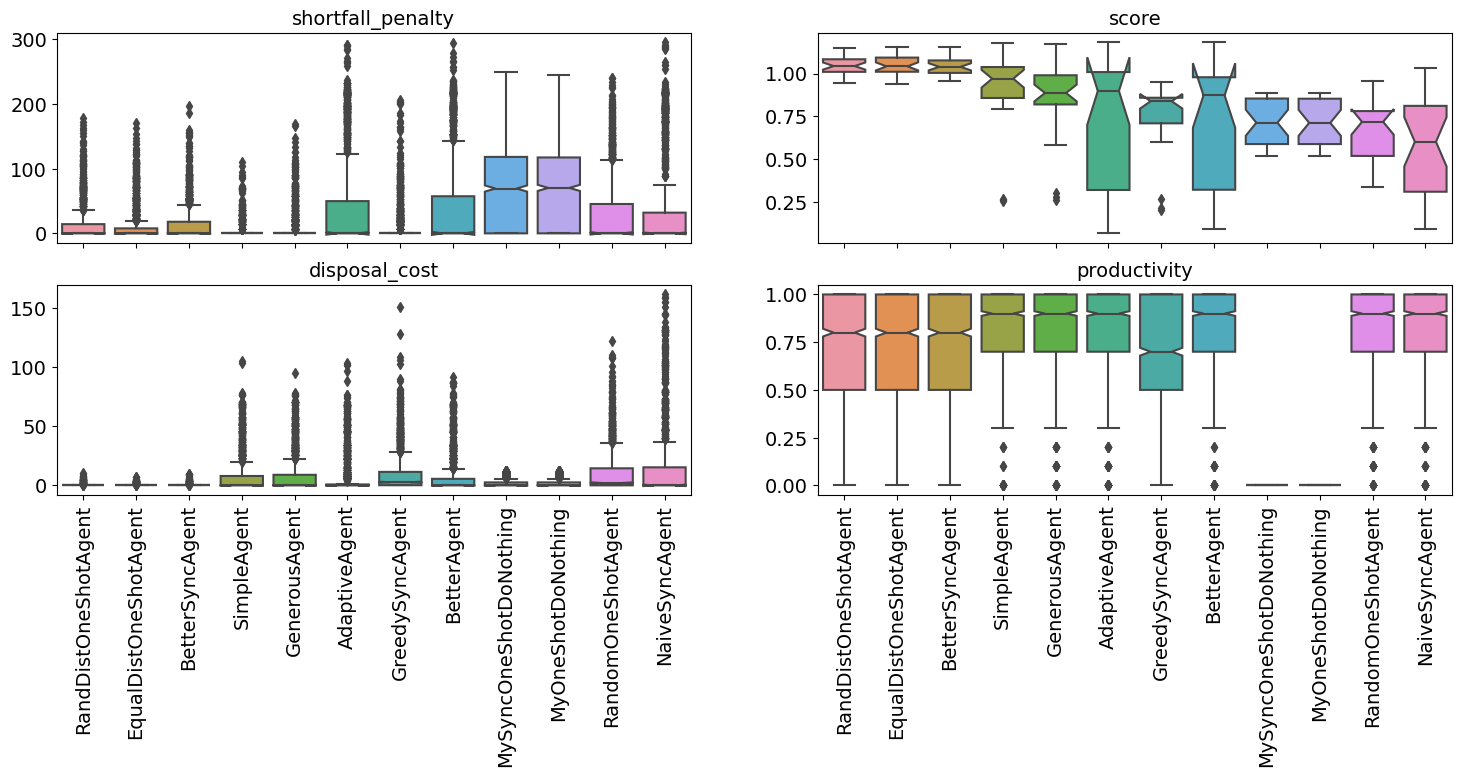
or in more details:
single_agent_runner.plot_stats(agg=False, stats="score", legend_ncols=4, ylegend=1.4);
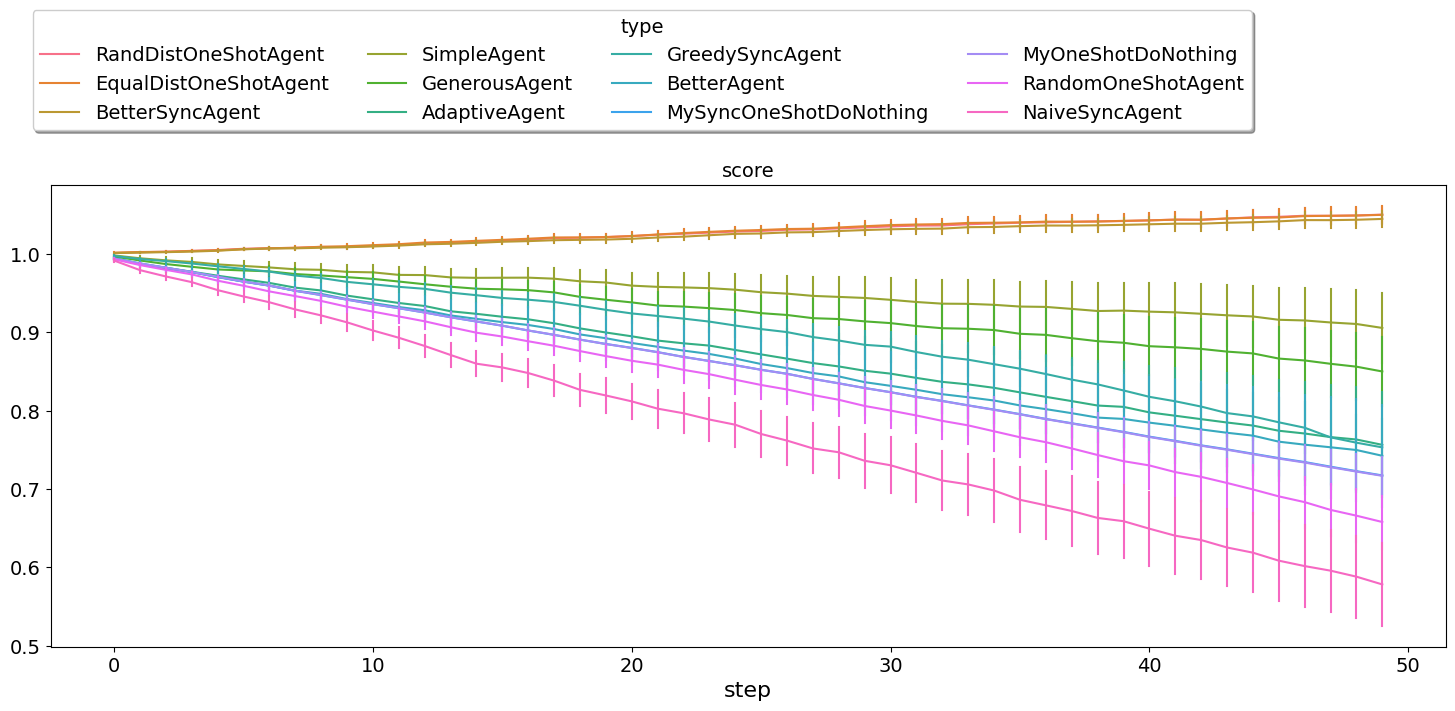
You can easily notice that our SimpleAgent is actually hard to beat. No
built-in agents can actually beat it. The one that comes closes is
`RandDistOneShotAgent <https://scml.readthedocs.io/en/latest/autoapi/scml/oneshot/agents/rand/index.html#scml.oneshot.agents.rand.RandDistOneShotAgent>`__.
The way we just compared these agents is unbiased because all agents are allowed to control the same factories in the same simulation envoironment. Nevertheless, it is not the exact method used in the ANAC competition. The best way to compare these agents is to run a tournament between them. You already learned how to do that in the previous tutorial and we will not repeate it here.
If you are running this notebook, please note that the tournament running methods ``anac2024_*`` may not work within a notebook environment. You can just move your code to a normal python script and it will run correctly
Just out of curiousity, let’s see how do these agents compare against each other if they are allowed to control the whole market instead of a single agent:
full_market_runner = WorldRunner.from_runner(
single_agent_runner, control_all_agents=True
)
for a in (
BetterSyncAgent,
SimpleAgent,
GenerousAgent,
BetterAgent,
AdaptiveAgent,
MyOneShotDoNothing,
MySyncOneShotDoNothing,
NaiveSyncAgent,
RandDistOneShotAgent,
EqualDistOneShotAgent,
GreedySyncAgent,
):
full_market_runner(a)
full_market_runner.plot_stats();
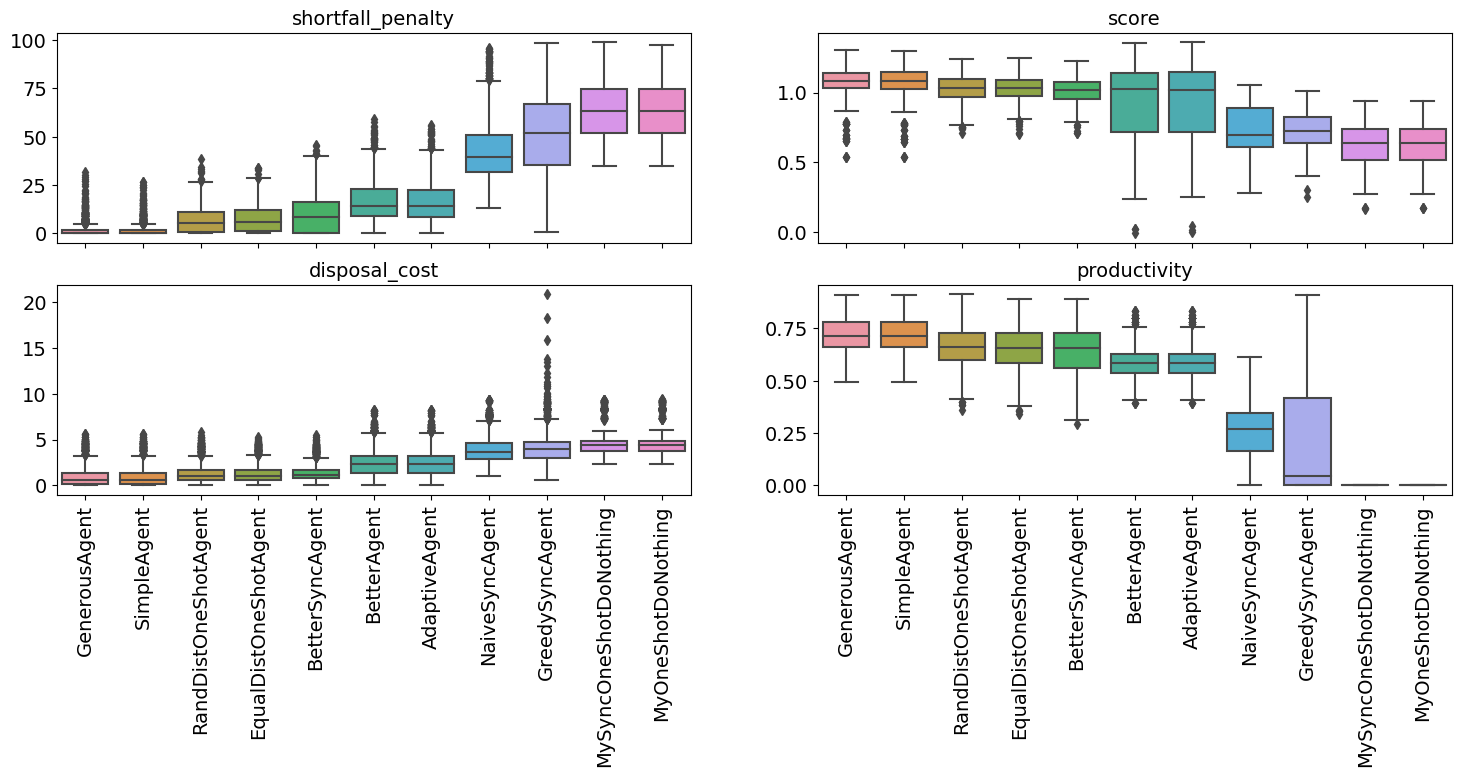
full_market_runner.score_summary()
| type | score | count | mean | std | min | 25% | 50% | 75% | max | |
|---|---|---|---|---|---|---|---|---|---|---|
| 4 | GenerousAgent | 1.070493 | 345.0 | 1.070493 | 0.135989 | 0.536034 | 1.032085 | 1.085166 | 1.142087 | 1.300736 |
| 10 | SimpleAgent | 1.068242 | 345.0 | 1.068242 | 0.139472 | 0.536031 | 1.028666 | 1.080434 | 1.147335 | 1.294385 |
| 9 | RandDistOneShotAgent | 1.027933 | 345.0 | 1.027933 | 0.093962 | 0.712678 | 0.965100 | 1.032097 | 1.100143 | 1.242283 |
| 3 | EqualDistOneShotAgent | 1.024942 | 345.0 | 1.024942 | 0.096280 | 0.706985 | 0.975430 | 1.034344 | 1.090284 | 1.249036 |
| 2 | BetterSyncAgent | 1.008757 | 345.0 | 1.008757 | 0.091677 | 0.710329 | 0.952090 | 1.021285 | 1.072802 | 1.228448 |
| 1 | BetterAgent | 0.931797 | 345.0 | 0.931797 | 0.264753 | -0.006554 | 0.720905 | 1.023227 | 1.139277 | 1.353749 |
| 0 | AdaptiveAgent | 0.931182 | 345.0 | 0.931182 | 0.267260 | 0.002970 | 0.721272 | 1.015031 | 1.145970 | 1.358184 |
| 8 | NaiveSyncAgent | 0.737871 | 345.0 | 0.737871 | 0.181944 | 0.282766 | 0.608280 | 0.696524 | 0.886265 | 1.053605 |
| 5 | GreedySyncAgent | 0.726222 | 345.0 | 0.726222 | 0.128911 | 0.251198 | 0.642664 | 0.723267 | 0.824934 | 1.008826 |
| 7 | MySyncOneShotDoNothing | 0.628966 | 345.0 | 0.628966 | 0.156728 | 0.170207 | 0.516510 | 0.637839 | 0.740412 | 0.941539 |
| 6 | MyOneShotDoNothing | 0.628928 | 345.0 | 0.628928 | 0.156759 | 0.172867 | 0.516478 | 0.642465 | 0.740913 | 0.942300 |
You can find all the agents available in the scml package for the
one-shot game under scml.oneshot.agents including the ones developed
in this tutorial (with some modifications):
import scml.oneshot.agents as agents
print([_ for _ in agents.__dir__() if _.endswith("Agent")])
[ 'SingleAgreementAspirationAgent', 'GreedyOneShotAgent', 'GreedySyncAgent', 'GreedySingleAgreementAgent', 'OneshotDoNothingAgent', 'RandomOneShotAgent', 'RandDistOneShotAgent', 'EqualDistOneShotAgent', 'SyncRandomOneShotAgent', 'SingleAgreementRandomAgent' ]
Running against winners from previous years
scml-agents
package from pip:pip install scml-agents
You can then get agents using the get_agents() function from this
package:
from scml_agents import get_agents
winners = [
get_agents(y, track="oneshot", winners_only=True, as_class=True)[0]
for y in (2021, 2022, 2023)
]
print(winners)
[ <class 'scml_agents.scml2021.oneshot.team_86.agent112.Agent112'>, <class 'scml_agents.scml2022.oneshot.team_134.agent119.PatientAgent'>, <class 'scml_agents.scml2023.oneshot.team_poli_usp.quantity_oriented_agent.QuantityOrientedAgent'> ]
Let’s add them to the mix
for t in winners:
single_agent_runner(t)
single_agent_runner.score_summary()
| type | score | count | mean | std | min | 25% | 50% | 75% | max | |
|---|---|---|---|---|---|---|---|---|---|---|
| 12 | RandDistOneShotAgent | 1.050543 | 30.0 | 1.050543 | 0.056464 | 0.943806 | 1.009891 | 1.043736 | 1.083475 | 1.149113 |
| 4 | EqualDistOneShotAgent | 1.050253 | 30.0 | 1.050253 | 0.063765 | 0.941294 | 1.010509 | 1.041863 | 1.093314 | 1.157501 |
| 3 | BetterSyncAgent | 1.045027 | 30.0 | 1.045027 | 0.058560 | 0.954717 | 1.003720 | 1.039322 | 1.076773 | 1.155156 |
| 11 | QuantityOrientedAgent | 0.991510 | 30.0 | 0.991510 | 0.137315 | 0.635187 | 0.942474 | 1.033218 | 1.056788 | 1.175083 |
| 10 | PatientAgent | 0.909359 | 30.0 | 0.909359 | 0.237183 | 0.306590 | 0.832855 | 0.951183 | 1.062123 | 1.181927 |
| 14 | SimpleAgent | 0.905806 | 30.0 | 0.905806 | 0.243713 | 0.256752 | 0.857049 | 0.969827 | 1.038091 | 1.176166 |
| 5 | GenerousAgent | 0.850194 | 30.0 | 0.850194 | 0.240858 | 0.260795 | 0.819196 | 0.886290 | 0.989907 | 1.171139 |
| 0 | AdaptiveAgent | 0.756491 | 30.0 | 0.756491 | 0.367015 | 0.064872 | 0.318639 | 0.897773 | 1.008595 | 1.181927 |
| 6 | GreedySyncAgent | 0.753260 | 30.0 | 0.753260 | 0.198388 | 0.198635 | 0.708680 | 0.837813 | 0.858390 | 0.951864 |
| 1 | Agent112 | 0.742568 | 30.0 | 0.742568 | 0.358775 | 0.065792 | 0.334495 | 0.870720 | 1.025299 | 1.181927 |
| 2 | BetterAgent | 0.742522 | 30.0 | 0.742522 | 0.355723 | 0.087694 | 0.320086 | 0.871921 | 0.978388 | 1.181927 |
| 8 | MySyncOneShotDoNothing | 0.717437 | 30.0 | 0.717437 | 0.128590 | 0.518223 | 0.587364 | 0.712251 | 0.853799 | 0.885967 |
| 7 | MyOneShotDoNothing | 0.716924 | 30.0 | 0.716924 | 0.128240 | 0.518197 | 0.587324 | 0.711476 | 0.852739 | 0.885616 |
| 13 | RandomOneShotAgent | 0.657930 | 30.0 | 0.657930 | 0.185348 | 0.336662 | 0.517957 | 0.717340 | 0.780287 | 0.954094 |
| 9 | NaiveSyncAgent | 0.578200 | 30.0 | 0.578200 | 0.288741 | 0.087481 | 0.308480 | 0.600469 | 0.810890 | 1.034915 |
single_agent_runner.plot_stats(stats="score");
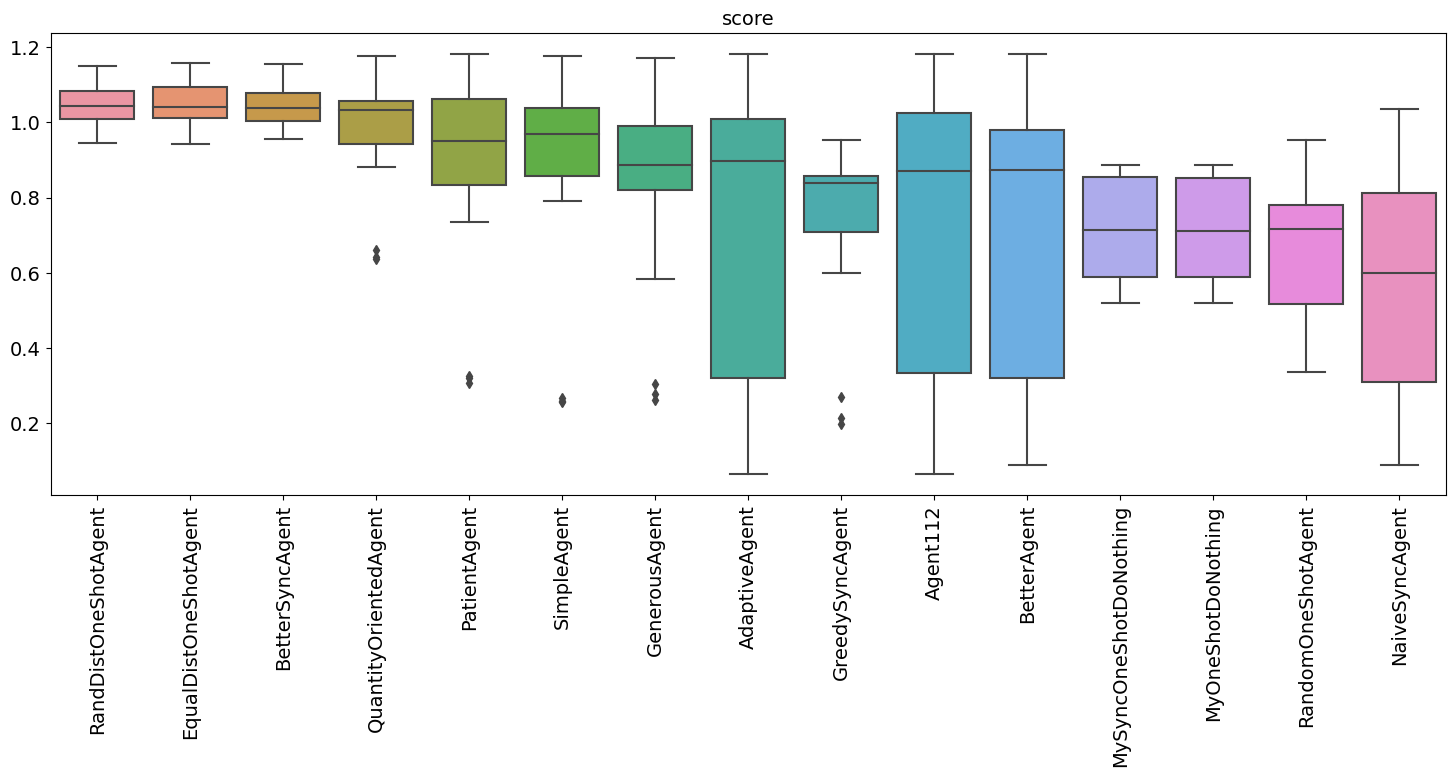
QuantityOrientedAgent, the winner of SCML 2023 OneShot is the best
performing agent followed by PatientAgent winner of the SCML 2022
OneShot competition. Nevertheless, the differences between these agens
and our SimpleAgent Can you beat them? The next tutorial explains
how to try to achieve that using Reinforcement Learning but now you have
enough information to build your own agent for SCML OneShot. Happy
hacking
Download Notebook.